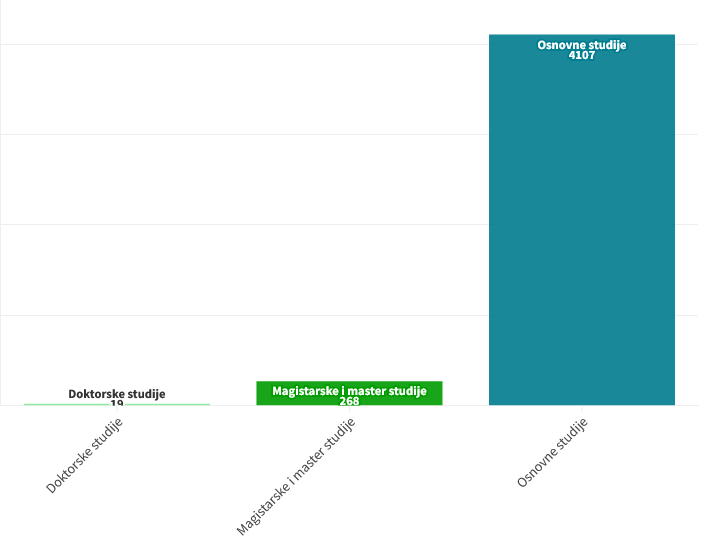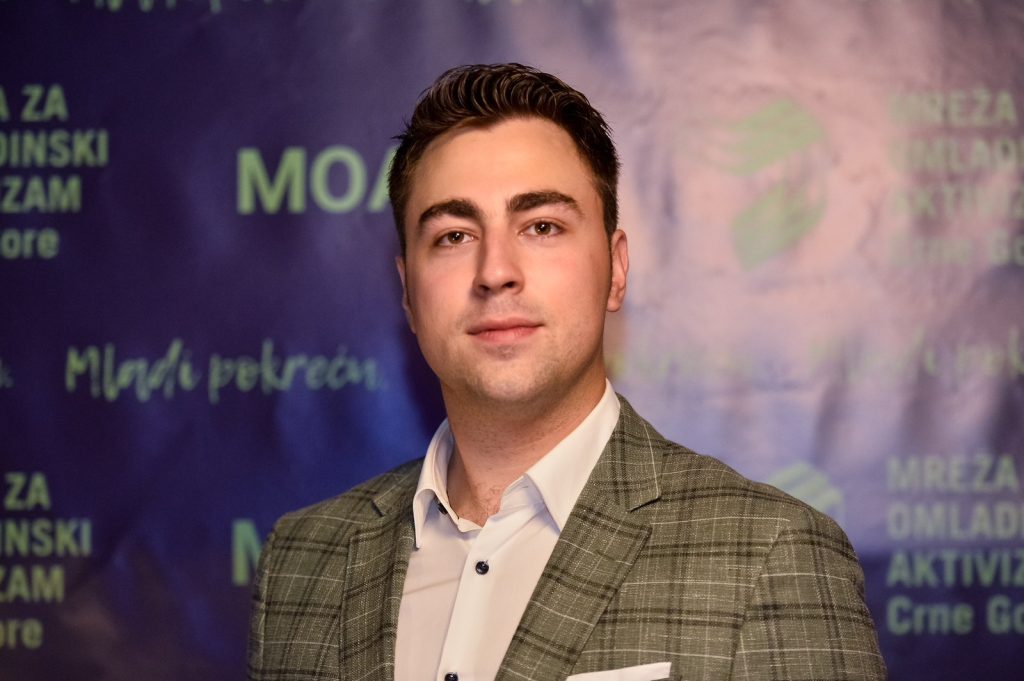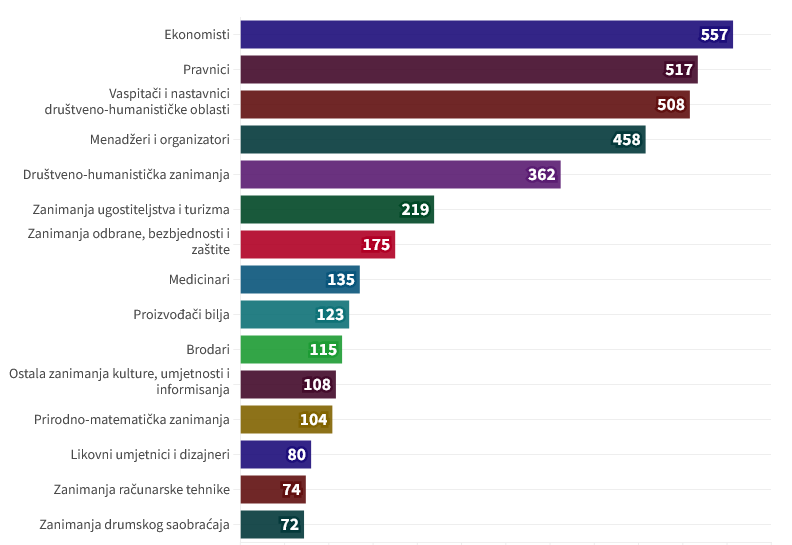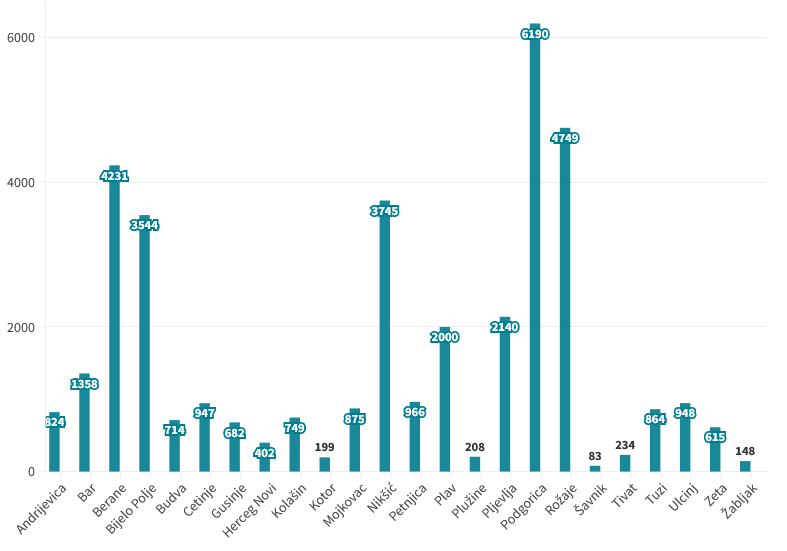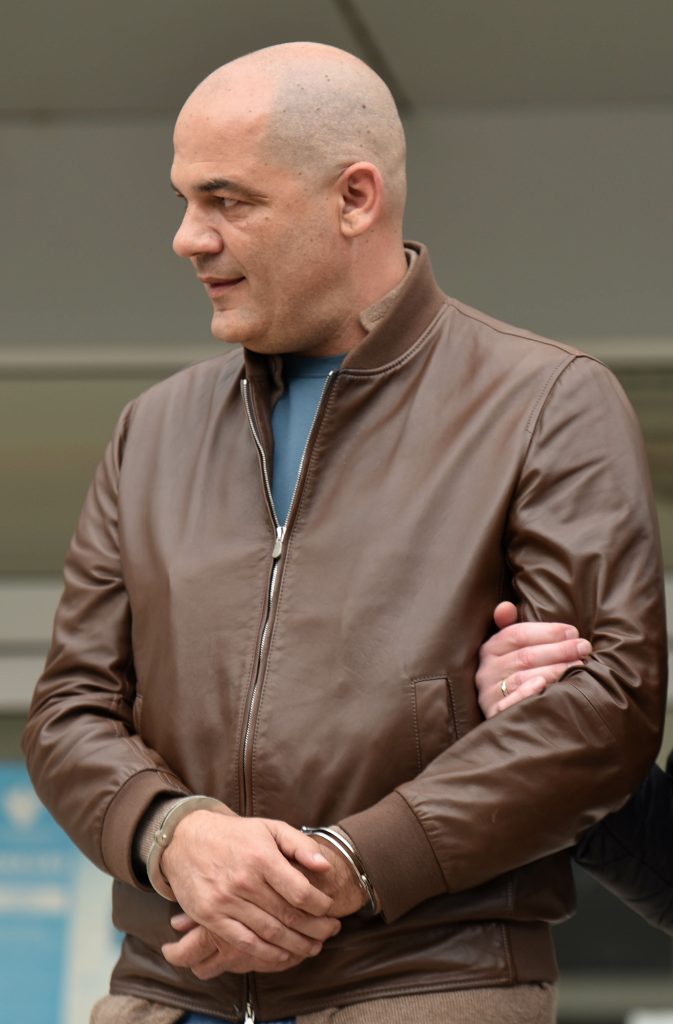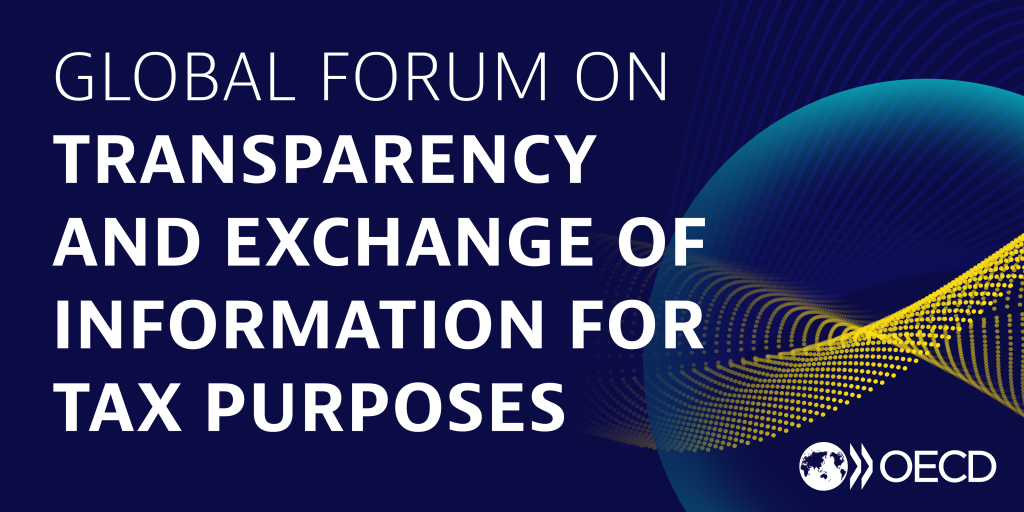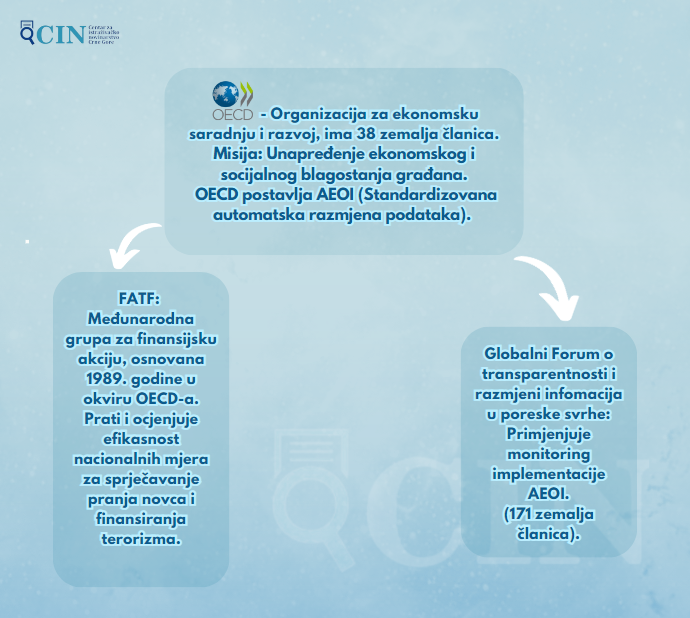Govor mržnje u Crnoj Gori dominantno izazivaju političari, političke partije i državni zvaničnici, a takav govor pravni sistem ne kažnjava, neki su od zaključaka izvještaja Centra za istraživačko novinarstvo Crne Gore (CIN-CG).
Autorka izvještaja Ana Nenezić je istakla da je monitoringom medija, od aprila 2022. do decembra 2023. konstatovano 100 incidenata, najviše od strane političara i medija.
„ Utvrđeno je da su najčešći narativi mržnje u odnosu na polne, etničke, vjerske ili ideološke razlike, te da je primjena regulative u praksi neefikasna“, navela je Nenezić.
Direktorica CIN-CG Milka Tadić Mijović je dodala da su opasne poruke sve dostupnije, kao i kanali kojima se šire, te da je u pozadini uvijek mržnja koju podstiču političke elite.
Ona je dodala da je CIN-CG, tokom četvorogodišnjeg praćenja ove oblasti konstatovao više stotina incidenata i dao veliki broj reakcija na govor mržnje, čija su meta bile etničke i religijske grupe, manjinske zajednice, žene, posebno one u javnoj sferi, pripadnici različitih seksualnih orjentacija, kritički orjentisani pojedinci... Zabrinjavajuć je i porast bujanja nacionalizma, dodala je Tadić Mijović, ali i retorika pojedinih religijskih lidera, te relativizacija ratnih zločina iz devedesetih.
Ministarka kulture i medija dr Tamara Vujović je naglasila da se nada da će novi set medijskih zakona biti usvojen u aprilu, te da će ova regulativa pomoći u borbi protiv govora mržnje.
Ministarka i generalni direktor za medije u Ministarstvu Neđeljko Rudović su pojašnjavali da je medijskim zakonima i strategijom predviđeno značajno više sredstava za Fond za pluralizam, od preko 2,5 miliona eura, čija će nova tema biti borba protiv govora mržnje i kao podrška onima koji se drže profesionalnih standarda. Takođe, planira se formiranje Mreže za borbu protiv govora mržnje, SOS linija za žrtve takvog govora, ali i da hitan sudski postupak može pokrenuti i meta govora mržnje, a ne samo tužilac.
„ Najvažnija aktivnost će biti formiranje ove Mreže koja će javno osramotiti one koji nas lažu i šire govor mržnje“, istakao je Rudović.
On je dodao i da će novčano biti kažnjavani neregistrovani mediji, te da neće postojati mogućnost oglašavanja u takvim medijima.
Doskorašnja zastupnica Evropskog suda u Strazburu Valentina Pavličić je istakla da pravosuđe mora biti brana govoru mržnje, te da sudski organi ne primjenjuju pravilno standarde u toj oblasti: „Govor mržnje je otrov sistema društva“.
„ Kada budemo imali jednog političara u Crnoj Gori osuđenog zbog govora mržnje, onda će i drugi razmisliti kako će reagovati. Govor mržnje je danas mnogo perfidniji i teži za prepoznavanje“, zaključila je direktorica Agencije za elektronske medije (AEM) Sunčica Bakić.
Konferenciju je organizovao CIN-CG, u završnici četvorogodišnjeg međunarodnog projekta „Mreža za izvještavanje o različitosti“. Nosilac projekta je Media Diversity Institute iz Londona, a projekat je finansijski podržala Evropska komisija.
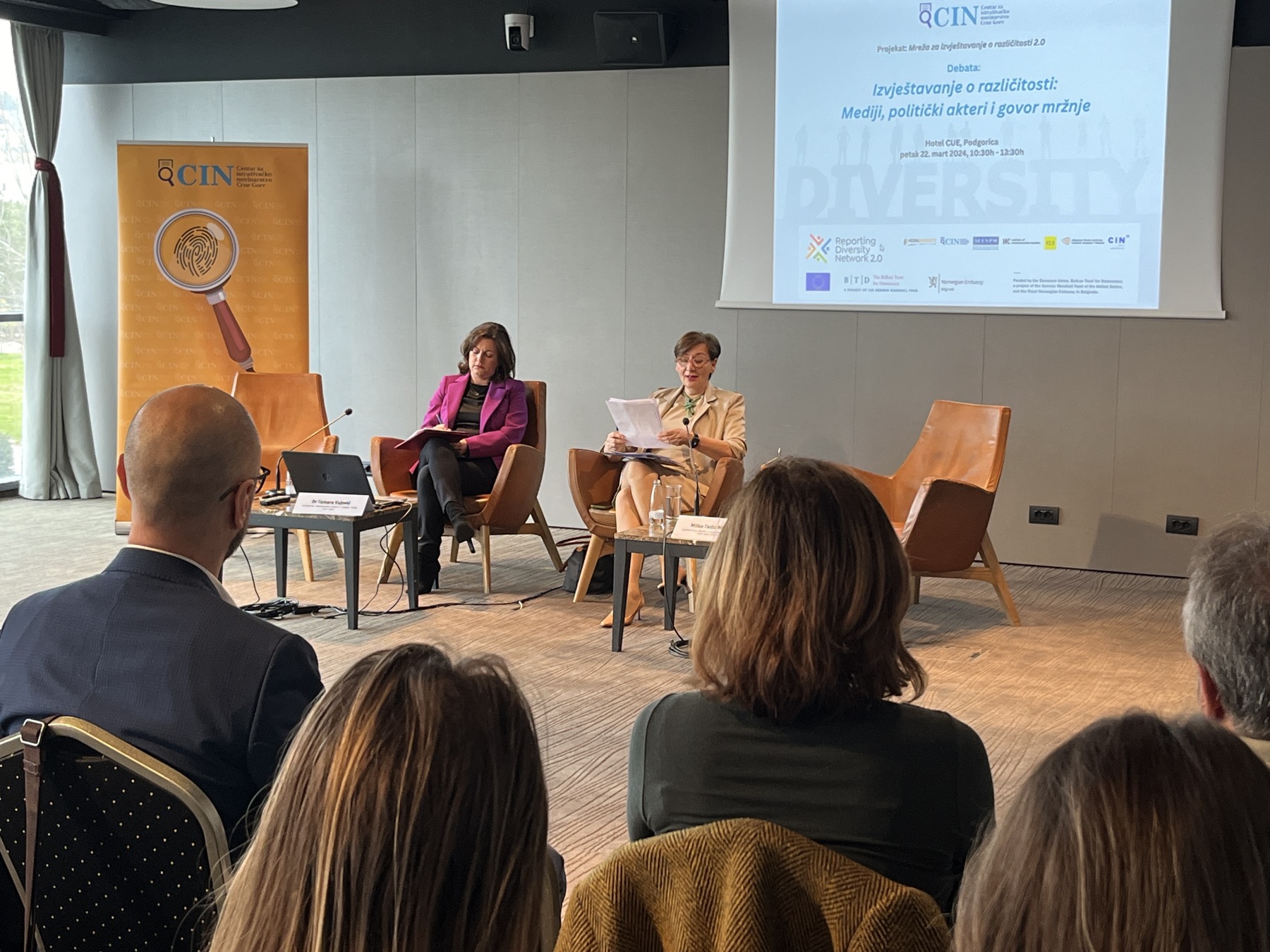
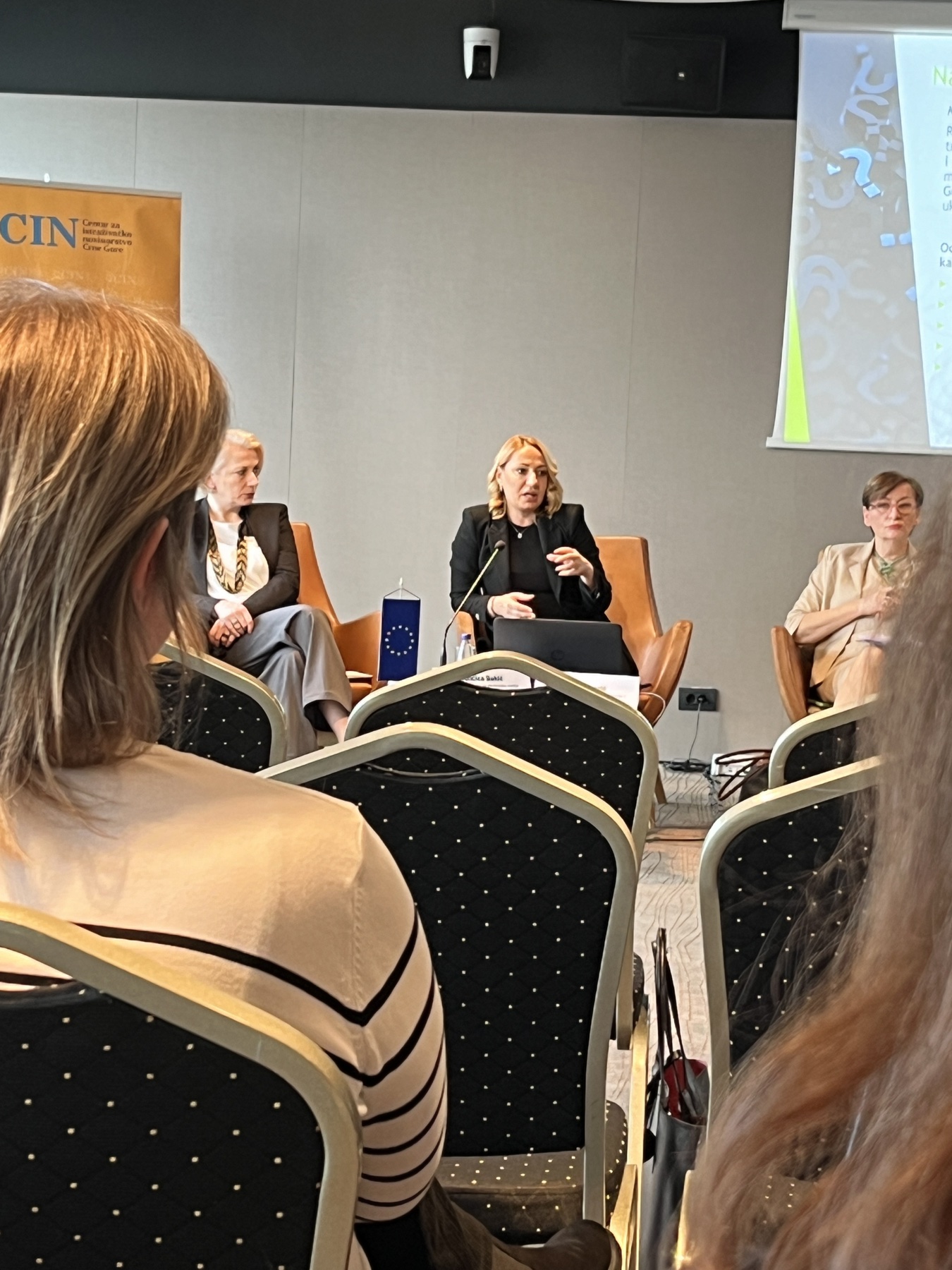
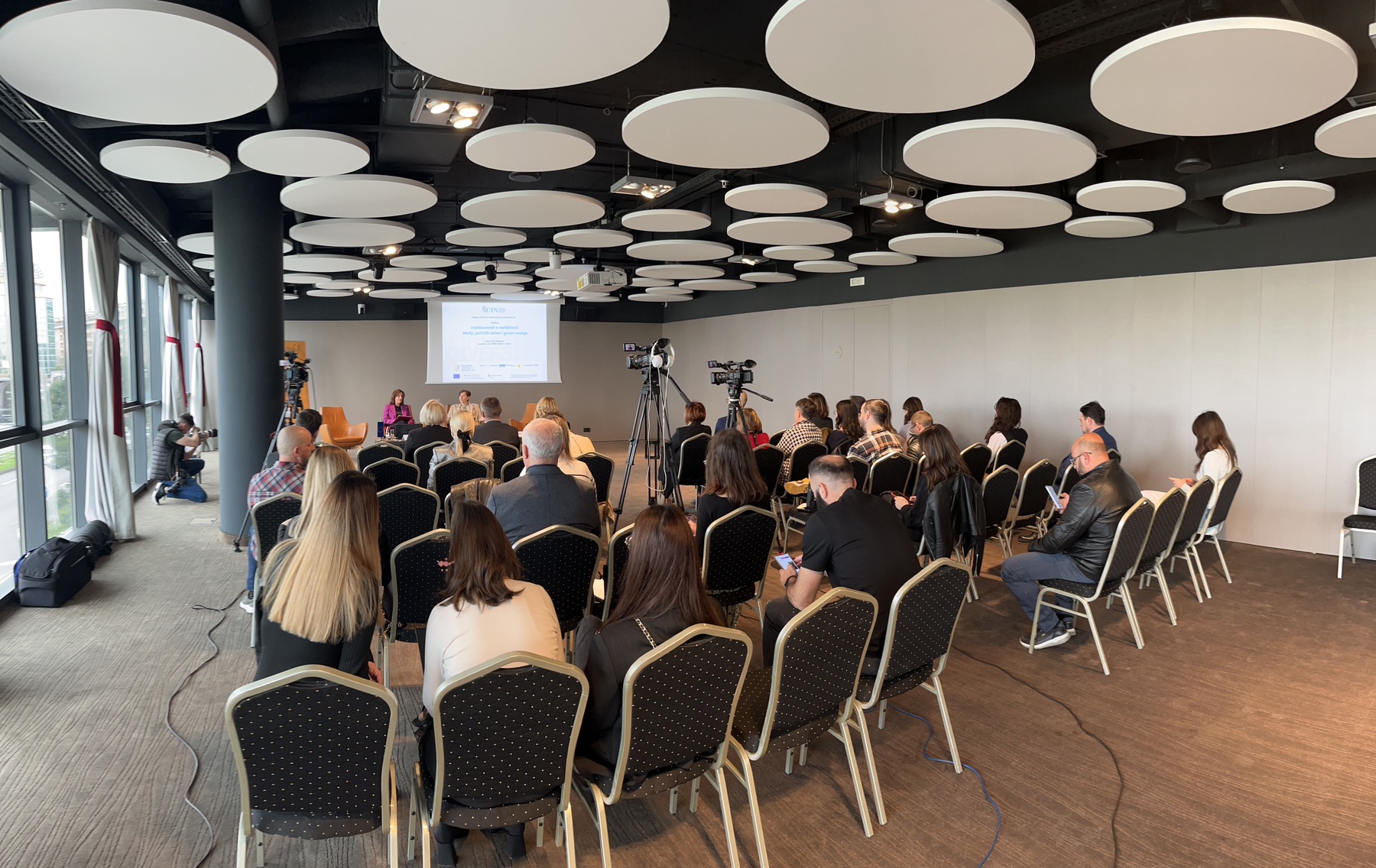
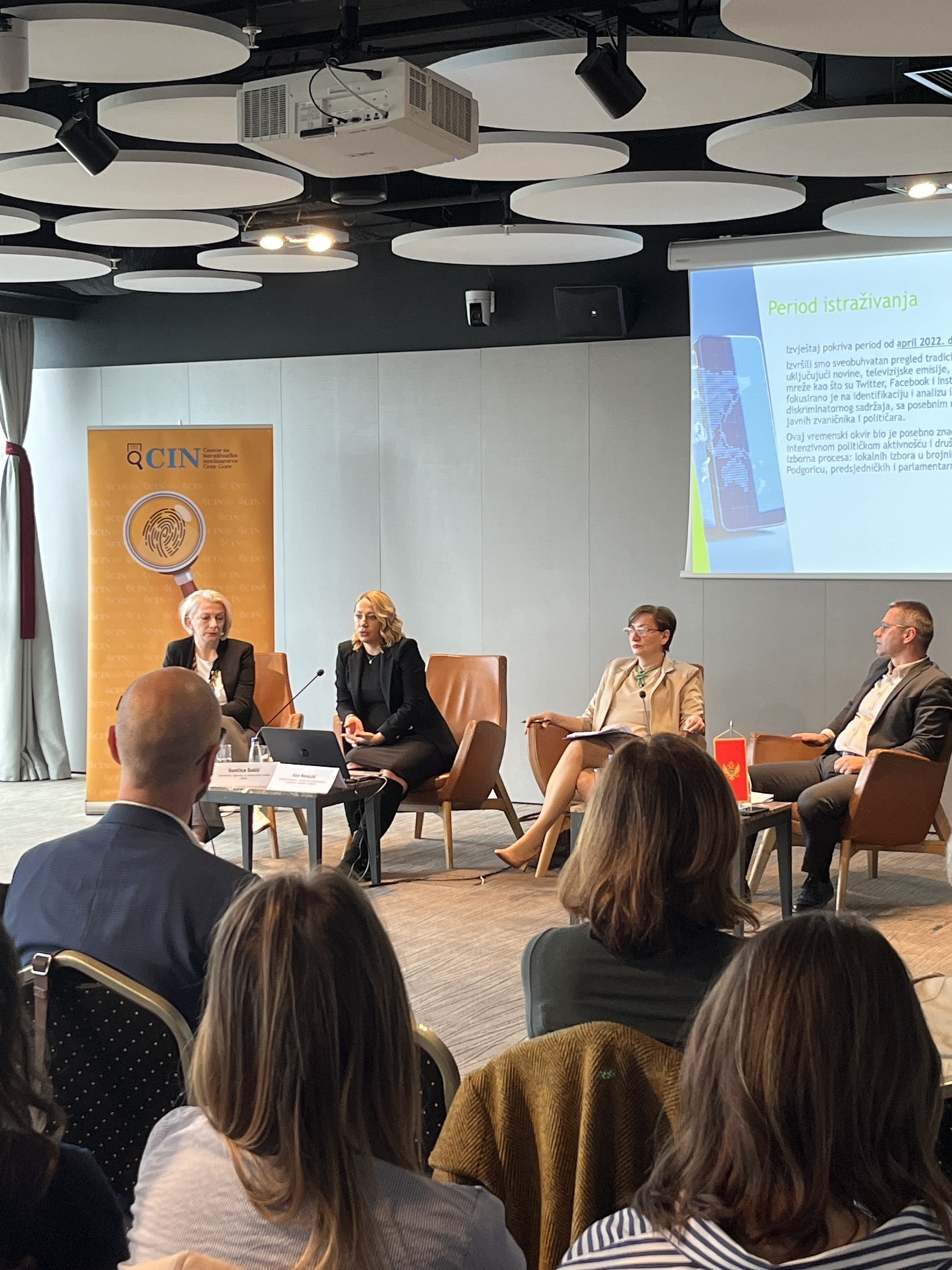
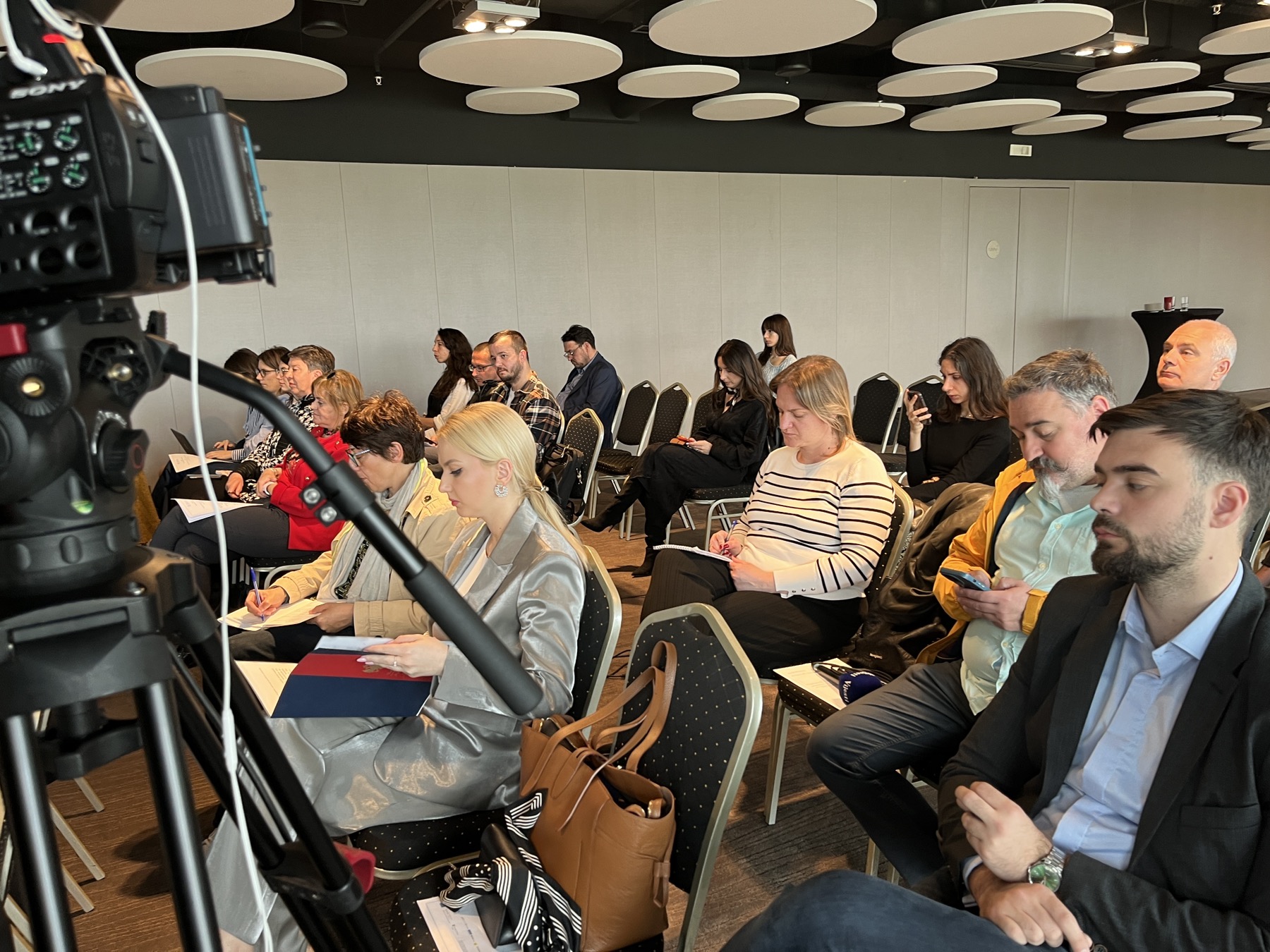
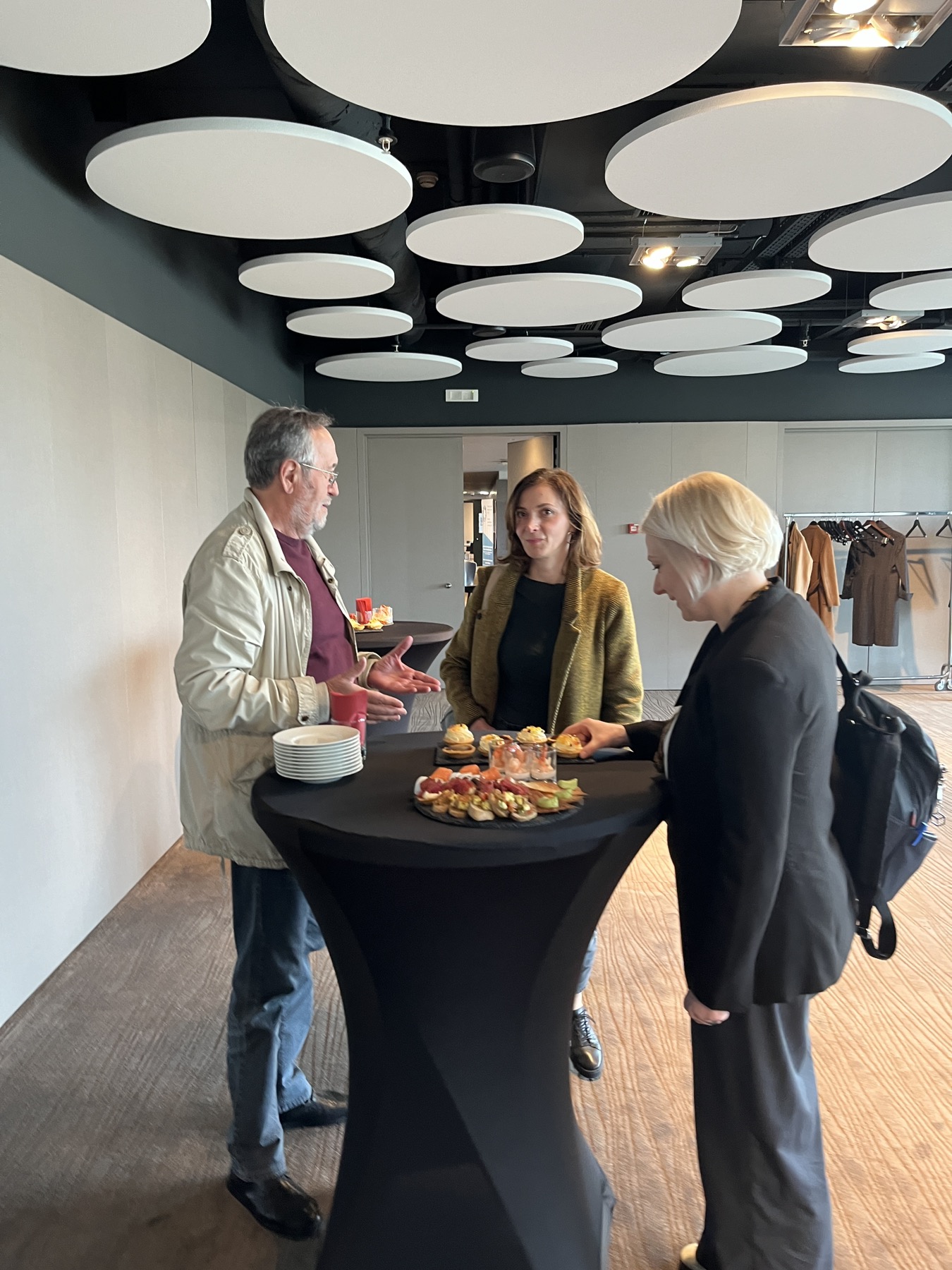
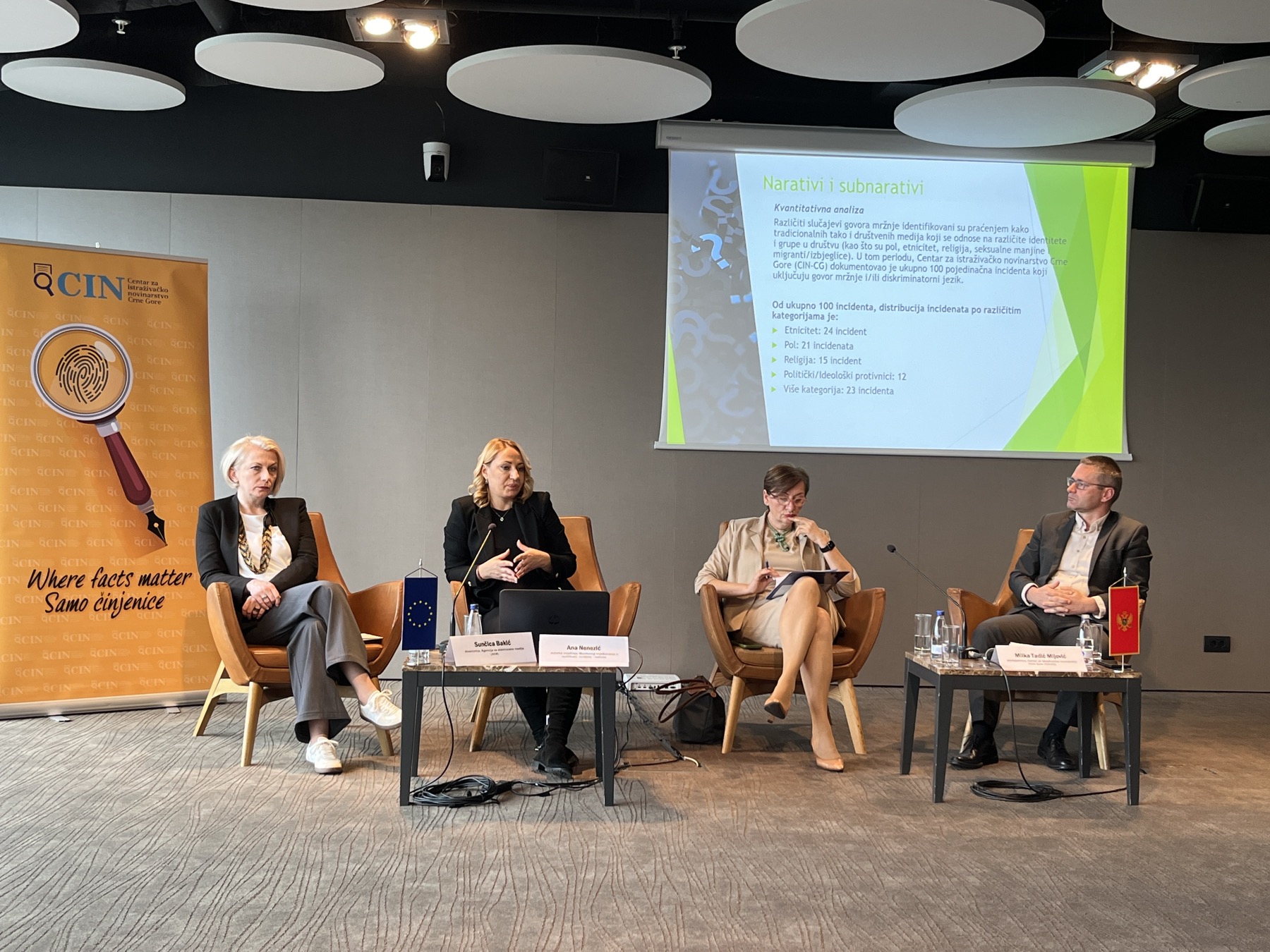
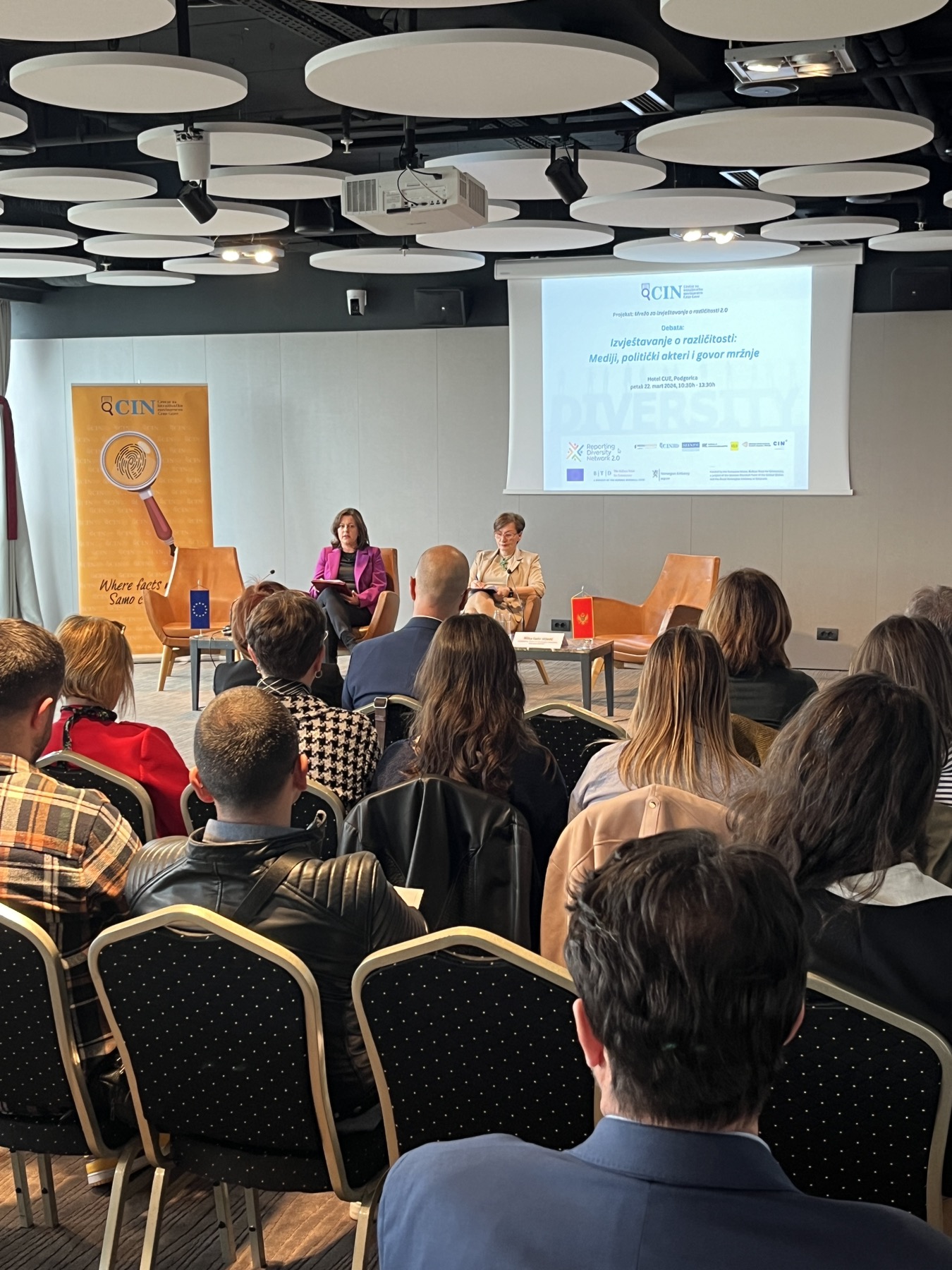
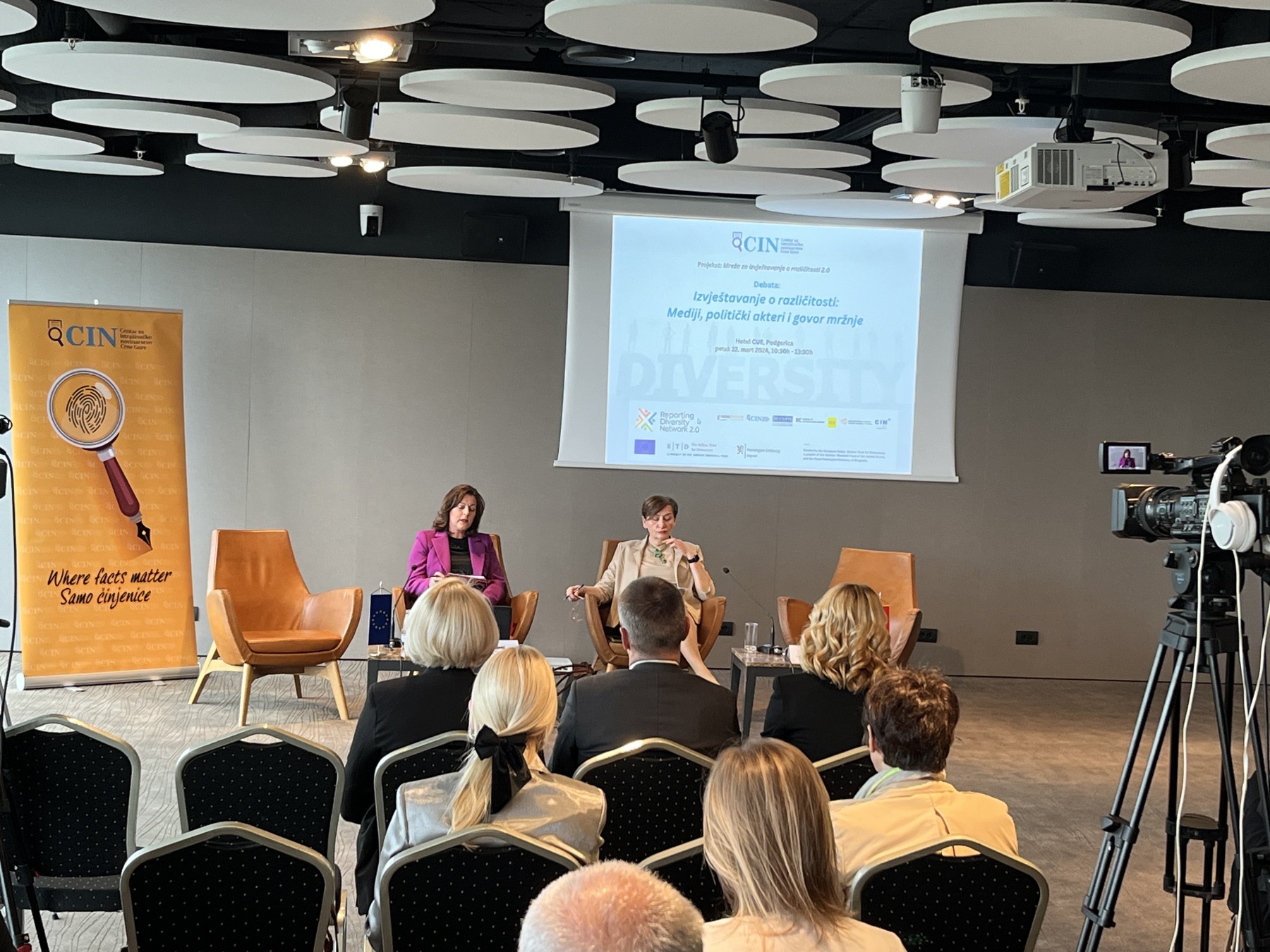
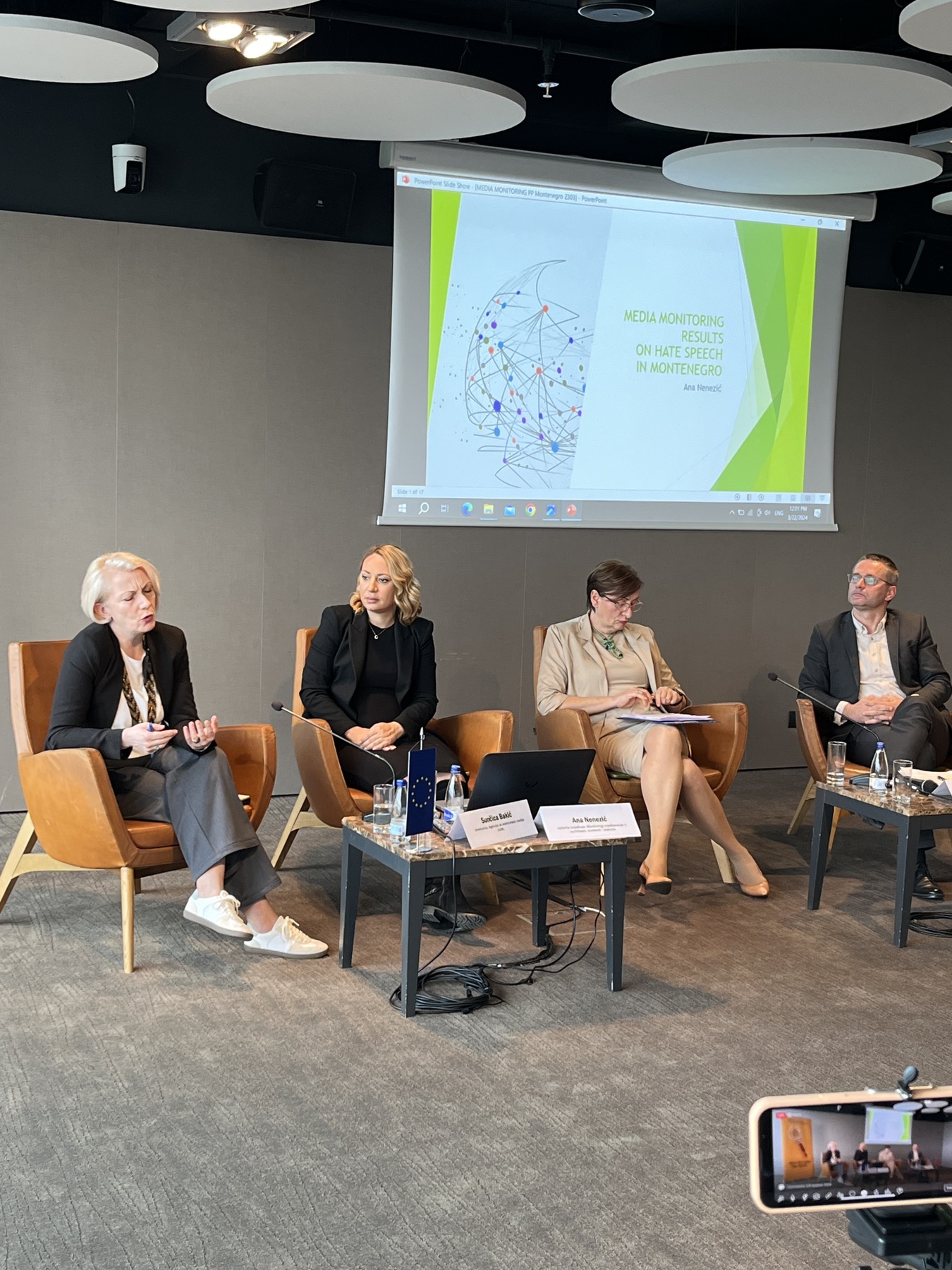
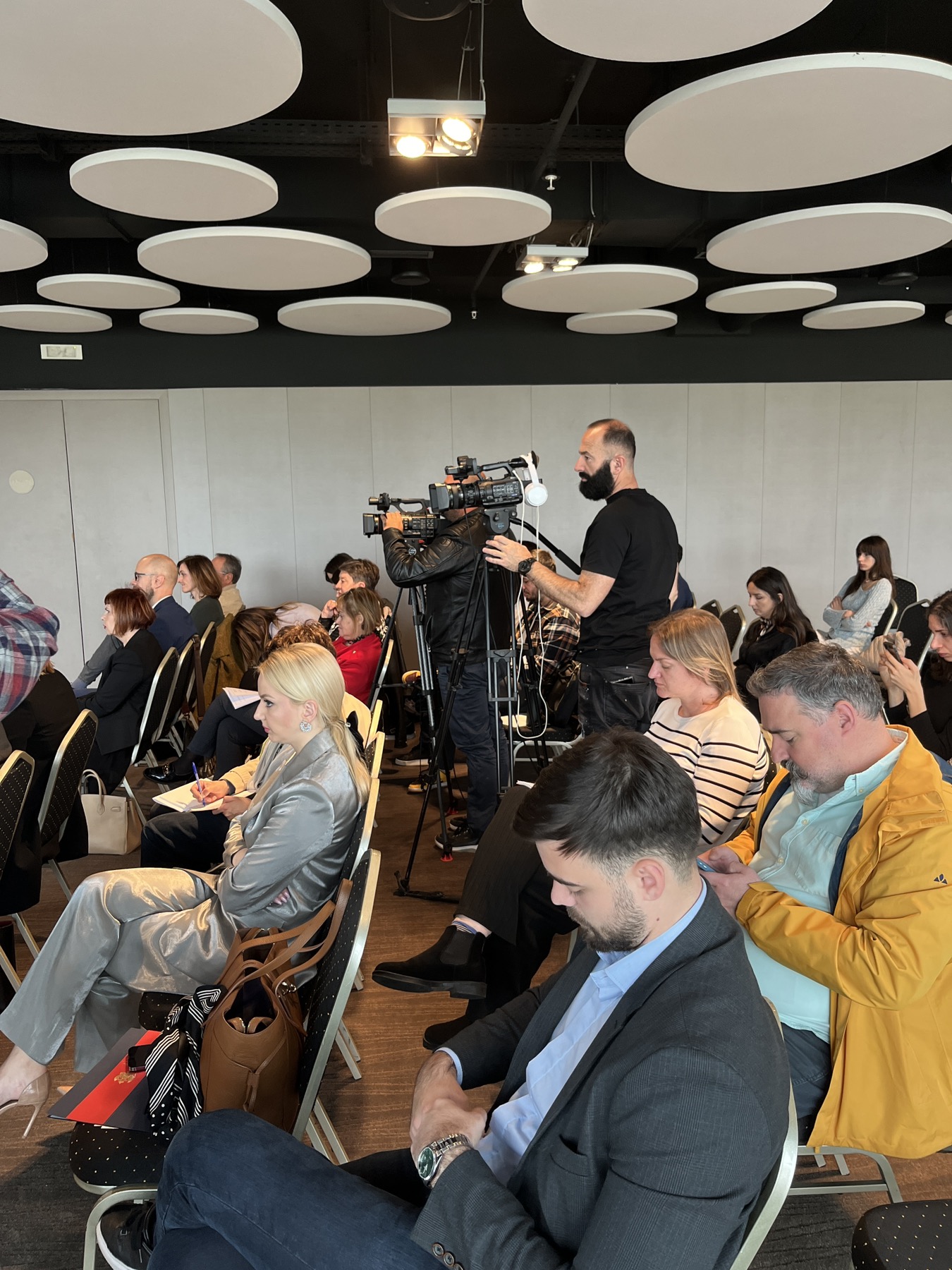

Competent institutions assert that the state will crack down on one of the most lucrative illegal businesses in Montenegro, while shifting the blame for failure onto one another
By Maja Boričić and Dražen Đurašković
Piles of gravel everywhere, machines operating right by the shore, the riverbed expanded, and landslides on both sides of the riverbed, disrupting biodiversity... This is how the riverbed of the Morača River has been devastated for years by uncontrolled and illegal gravel exploitation. But similar scenes can also be found on other rivers in Montenegro. Despite the fact that these constitute criminal offences, the judiciary has failed for years to respond adequately to this crime.
As revealed by the Centre for Investigative Journalism of Montenegro (CIN-CG), out of 25 criminal proceedings initiated for illegal gravel exploitation over the last five years, only five have been completed. Two were dismissed, while three resulted in symbolic penalties – two fines of 1,700 and 800 euros respectively, as well as one suspended sentence.
The threatened penalty for the offences that the prosecution charged the defendants with is imprisonment ranging from three months to five years and a fine. Therefore, even those few valid judgments consistently fall below the legally prescribed minimum.
Although the Government banned gravel exploitation six years ago, it rendered the moratorium decision meaningless by leaving the possibility for exploitation to continue through the so-called riverbed regulation. Reckless exploitation has continued along the Morača River and other Montenegrin rivers, causing the state to suffer multi-million losses.
According to Irma Muhović of the Montenegrin Ecologists Society (CDE), a combination of state determination, strict law enforcement, institution strengthening, improved coordination and alignment with international standards are essential factors in overcoming the issue of illegal gravel exploitation.
Speaking to CIN-CG, she underscores that the lack of effective justice enforcement and punishment for those responsible for illegal gravel exploitation sends a negative signal and undermines efforts in combating this issue.
“Insufficiently harsh penalties or a low rate of convictions will not only fail to deter offenders, but may also encourage further unlawful activities,” she warns.
To address this problem, she concludes, it is crucial for the state to demonstrate determination and enforce strict sanctions. Strengthening institutions and ensuring adequate resources and capacities for the effective implementation of judicial processes are also necessary.
“Establishing an effective monitoring and control system for gravel exploitation, coupled with rigorous punishment for lawbreakers, can be of great assistance in combating illegal gravel exploitation,” she underscores.
Two deferred prosecutions and one suspended sentence
Two cases initiated before the Basic State Prosecutor’s Office ended with deferred prosecution. Predrag Maraš and his company PE Mar were fined 1,700 euros for the criminal offence of “unauthorized engagement in economic, banking, stock exchange and insurance activities.”
Milivoje Mugoša was fined 800 euros for two criminal offences. In addition to the offence charged to Maraš, Mugoša was also convicted of “unlawful occupation of land,” which, according to the law, is liable to a fine or imprisonment for up to one year.
In both cases, the prosecution was represented by the current prosecutor of the Special State Prosecutor’s Office, Vukas Radonjić, who used to be a prosecutor in the Basic Prosecutor’s Office back then. In the meantime, he transitioned to work as a special prosecutor.
Deferred prosecution may be applied to criminal offences liable to a fine or imprisonment for up to five years. Such a penalty is solely decided by the prosecutor handling the case.
The only prison sentence, namely a suspended three-month sentence, was imposed on Danilo Petrović, the owner of the Cijevna komerc company, for the same criminal offence for which Mugoša received a fine – “unlawful occupation of land.”
The court deemed Petrović’s lack of prior convictions, older age and being married with four children as mitigating circumstances.
The institution of the Protector of Property and Legal Interests of Montenegro joined the criminal prosecution against the defendant, but the court did not consider this as an aggravating circumstance.
Last July, he was given a suspended sentence, meaning he will not go to prison if he does not commit another offence within the next year. The trial was presided over by Judge Ivana Becić of the Basic Court in Podgorica.
The prosecution charged Petrović with the mildest form of that criminal offence, even though the verdict established that the cadastral parcel in question is a river. The more severe form of that criminal offense is “if the occupied land is part of a protected forest, national park or other land with a special purpose, the offender shall be liable to imprisonment for a term of three months to three years.” According to the Law on State Property, rivers fall under natural resources.
In addition to these five cases, the Basic State Prosecutor’s Office in Podgorica is currently conducting preliminary investigations in another 12 cases.
The Special State Prosecutor’s Office is considering charges in three cases involving gravel exploitation – two against the Podgorica-based company Montenegro Petrol, one of which was transferred to the Basic State Prosecutor’s Office, and one against Cijevna komerc, with preliminary investigations being underway. CIN-CG has not received a response regarding whether there has been progress in these two cases.
The Basic Prosecutor’s Office in Kolašin dismissed charges against CRBC, a Chinese company that constructed the motorway, as well as against Montenegro Petrol for the theft of a protected natural resource. The other two charges against the Chinese company ended up in court.
Proceedings are underway against CRBC and the chief executive officer of the Chinese company Hei Shiqiang. In one case, they are being tried for the criminal offence of unreported construction activity and incomplete construction documents in conjunction with environmental damage.
“In one indictment, the accused caused environmental damage to a greater extent and over a wider area by excavating gravel material from the bed of the Tara River without having established environmental protection measures beforehand,” one draft indictment reads.
In the second case, they are charged with the destruction and damage of a protected natural asset. The draft indictment reads: “By exploiting the riverbed sediment 100 metres upstream from the plot […], the accused caused destruction to the Tara River, a natural resource, whose basin is included in the biosphere reserve under the UNESCO programme and enjoys national protection.”
The Prosecutor’s Office blames inspection bodies and inspection bodies blame the judiciary
Regarding responsibility for the lack of an adequate response from the state, the authorities are unable to reach a consensus and instead shift the blame onto one another.
The Prosecutor’s Office asserts that the effective handling of criminal complaints concerning illegal gravel exploitation largely depends on the actions of inspectors, who need to identify the owners of the machinery found in the riverbeds and seek police assistance... It is also noted that upon reporting to the police, a relevant prosecutor should also be notified of each case. The Prosecutor’s Office stresses that this is important, because “it usually takes several months from the date of inspection to the date of filing a criminal complaint, which further complicates the process of proving.”
At the initiative of Stevo Muk, a member of the Prosecutorial Council from the non-governmental sector, the Prosecutorial Council recently requested and received information from the prosecutor’s offices about what has been done in cases initiated due to gravel exploitation. However, that is all the Prosecutorial Council has done so far in respect of that issue.
“The work of state prosecutor’s offices in these cases should be intensified. There needs to be better coordination among inspections and expedited delivery of field reports to the police or the prosecutor’s office,” Muk emphasized in a statement to CIN-CG.
He added that there are too many cases that have been underway for a long time, with few of them reaching a conclusion.
Muk underscores that the head of the prosecutor’s office in Kolašin, during a session of the Prosecutorial Council, highlighted the importance of timely action by relevant inspection bodies. Among other things, they need to urgently provide field reports to the police and the prosecutor’s office so that police-related and prosecutorial activities can be undertaken to identify individuals and gather evidence.
“Without this, effective action by the police and the Prosecutor’s Office is often impossible,” says Muk.
In response to questions from CIN-CG, the Administration for Inspection Affairs said they were surprised by the prosecutors’ stance. They claim that they have not received any feedback from the prosecutor’s offices indicating that they have not done something well or that they need to take additional measures. They attribute the problem in the penal policy of the courts and the quality of the investigative actions conducted by the Prosecutor’s Office.
“Quality investigation, clear instructions from prosecutors to the police and evidence collection are not the responsibility of inspectors, but their own,” says Ana Vujošević, the director of the Administration.
Inspector Radulović: Prosecutors and judges devalue our work
Her colleague, water inspector Miodrag Radulović, emphasizes that prosecutors and judges are unwilling to do their jobs. “The track record of prosecution is very poor and greatly devalues our work,” Radulović notes. He also points out that the lenient penal policy of the courts further undermines the efforts of inspectors.
Inspector Radulović gives an example of gravel exploitation in Berane. After establishing that 5,000 cubic meters of material worth around 100,000 euros were stockpiled, they forwarded the case to the competent prosecutor’s office, which found that no criminal offence had occurred.
He adds that they appealed to the High State Prosecutor’s Office, which remanded the case to the Basic State Prosecutor’s Office for reconsideration.
“This is economic crime, and they are angry with us for filing complaints, for having to do their own job,” says Radulović.
The second case is even more dramatic and speaks to the attitude of the Misdemeanour Court towards exploiters. Radulović says that he filed misdemeanour charges twice against the Chinese company CRBC. In the second report, he indicated that the company repeated the same criminal offence. The court merged these two cases into one and fined CRBC 800 euros.
Inspectors can impose a minimum fine of 1,200 euros on the spot. If they assess that the illegal economic gain is higher than that amount, they should initiate proceedings before the court.
Miodrag Radulović says that inspectors most often assess that the case should go to court, but the court imposes fines below 1,200 euros.
“In this way, our work is completely devalued. What’s even more important is that those involved in gravel extraction have no reason to stop when they see what punishment they could face,” explains this water inspector.
The director of the Administration for Inspection Affairs, Ana Vujošević, confirms the story of her colleague. She claims that the situation is not much better in the Misdemeanour Court, adding that predominantly suspended sentences are imposed.
“For those who pocket hundreds of thousands of euros, the least of their concerns is a mere six-month suspension of their activities,” Vujošević said. She emphasizes that inspectors always act urgently, that their phones are never switched off, adding that they are available at night, after working hours, during holidays...
“I have repeatedly told them to call me and I will make sure to dispatch an inspector within 20 minutes at any time, but they have never reached out to me,” Vujošević underscores.
She adds that over 1,000 inspections have been carried out in the course of two years, more than 50 criminal complaints have been filed, and over 100,000 euros in fines have been collected.
“The only tangible result has been achieved by the inspection authority,” Vujošević concludes.
While the authorities blame each other, there remains hope that the rivers are not irreversibly lost and that the judiciary will finally embark on the fight against this ‘scourge’. This is the only way to curb crime.
Still no environmental department in the State Prosecutor’s Office
Veselinka Zarubica, the Chief Environmental Inspector, points out that that the determination of the extent of devastation falls within the responsibility of an expert witness, not an inspector. “There need to be traces of theft of state property and significant environmental devastation,” she says.
She explains that prosecutors justify their inaction on environmental issues by asserting that it falls outside their area of expertise, and that there should be specialized departments dealing with environmental crime. “But we have been discussing this for 30 years already,” Zarubica concludes.
Miodrag Radulović, the Chief Water Inspector, says that his inspectorate conducted 174 checks on illegal riverbed exploitation since the beginning of the year until 24 May.
“Two criminal complaints and one supplement to the criminal complaint have been filed, three penalty charge notices of 1,600 euros have been issued, and four case files have been submitted for assessment of the existence of a criminal offence," explains Radulović.
He adds that in one case, a measure prohibiting the disposal of the material that has been exploited was imposed. In one case, the case files were submitted to the Protector of Property and Legal Interests of Montenegro, and in two cases to the agricultural and forestry inspectorate.
The Prosecutorial Council has not come forward with the reports it receives
Stevo Muk, a member of the Prosecutorial Council, told CIN-CG that the Prosecutorial Council has not made any conclusions or taken any other action after receiving reports about the handling of cases of ‘illegal gravel exploitation’ by the prosecutor’s offices.
He adds that he requested the Prosecutorial Council to adopt a conclusion requesting further information from relevant prosecutor’s offices regarding their handling of cases related to illegal gravel exploitation, starting from the date of the previous report on the same topic. He says that the Prosecutorial Council accepted his proposal.
“In this way, we will demonstrate a sustained interest in the actions of state prosecutor’s offices and ensure monitoring of progress in these cases. The Prosecutorial Council has not adopted a relevant conclusion, recommendation or anything similar concerning previous reports,” Muk notes.
U svijetu je pokret #MeToo prije nekoliko godina pokrenuo lavinu ispovijesti o seksualnom uznemiravanju i zlostavljanju žena od nadređenih u svijetu šou biznsa, ali i u drugim profesijima. I u regionu je otkrivano više potresnih priča u kojima su, pored žena, žrtve seksulanog zlostavljanja bile i djevojčice. Crna Gora još uvijek ćuti. Nijedan slučaj seksualnog zlostavljanja nije ovdje javno predočen. Centar za istraživačko novinarstvo Crne Gore (CIN-CG) namjerava da prekine ovu tišinu i da sasluša sve koji žele da pričaju. Ukoliko ste doživjele bilo koju vrstu seksualnog uznemiravanja ili zlostavljanja u školi, na fakultetu, radnom mjestu, zdravstvenoj ustanovi ili nekom drugom mjestu, molimo Vas da ispričate Vašu priču. Mi ćemo štititi Vaš identitet, možete kontaktirati CIN-CG na adresu: redakcijacincg@gmail.com, a možete ostavljati i anonimne ispovijesti na sljedećem linku:
One of the most significant contracts signed by the mayor of Budva, originally from Spuž, is with the company Carat, led by Dragan Perović—a figure with whom Mayor Božović shares both personal and business connections. In Dubovica, where Carat is engaged in infrastructure development, the two are co-owners of land and residential property
Predrag Nikolić
According to multiple sources, Božović and Perović are godfathers. In early October of last year, Dragan's brother, Radovan Perović, was arrested. The Special State Prosecutor's Office (SSPO) suspects that he, along with Bojan Ojdanić and Vjekoslav Lambulić, was involved in forming a criminal organization and in the illicit production, possession, and distribution of narcotic drugs. Their arrests were a continuation of the broader investigation already being conducted by the SSPO against Božović.
This is just one of several contracts—collectively worth over 12 million euros—that the mayor of Budva signed while in remand prison. However, the most valuable is the deal with his godfather, totaling 4,499,181 euros. The contract with the company Carat covers infrastructure works for constructing three roads within the scope of the Detailed Urban Plan (DUP) Dubovica 1. According to the agreement, the project will be financed across multiple budget years, with 400,000 euros allocated in last year's budget.
Božović and Perović are connected not only by personal ties but also by business interests, particularly in Dubovica, the location of Božović's ancestral home. There, the two are co-owners of both land and residential property. One plot, measuring over 1,000 square meters, has eight owners; Božović holds a 50% stake, while Perović owns 24 out of 480 shares. On a second parcel of 1,738 square meters, Božović again holds half, and Perović's company, Carat, owns a sixteenth—an ownership structure mirrored in a third plot of 320 square meters.
The same ownership ratio—one-half held by Božović and one-sixteenth by Carat—applies to an 824-square-meter residential property in Dubovica. According to documents reviewed by the Center for Investigative Journalism of Montenegro (CIN-CG), Carat sold several apartments within this building in February and March of last year.
In July 2023, around the same time as the Dubovica agreement, Božović and Perović signed another contract—this one for the construction of road A 75-75 in Bečići, valued at 346,813 euros. Carat, the main contractor, engaged several subcontractors for the project, including Ving (Pljevlja), La Collina (Podgorica), Geo Plus (Podgorica), and Hidromont Engineering (Podgorica).
Over the past year, Božović signed multiple public procurement contracts totaling more than 10 million euros while incarcerated in Spuž prison. This practice continued into the current year, with Božović signing public procurement agreements worth two million euros in the first two months alone.
Milo Božović was arrested on the morning of April 13, 2023. The Special State Prosecutor's Office filed an indictment against him, accusing him of organizing a criminal group and trafficking drugs. While the indictment is still pending before the High Court, the court has allowed Božović to continue signing municipal documents from prison and to lead the Municipality.
Public Tenders Made Available After Journalists' Request
On the Municipality of Budva's website, information about all contracts was previously unavailable to the public under the' Tenders and Public Procurements' section. Only after inquiries from CIN-CG at the end of February were the tenders and public procurements updated and made accessible.
Bemax is the Municipality's second major partner. Božović signed a contract with this company for one of the most significant investments—reconstructing two key streets in the city center, 22 Novembar and Mediteranska. The project involves converting these streets into boulevards and constructing a roundabout.
With permission from the High Court, Božović signed this contract while in the Investigation Prison in Spuž at the end of last year. On January 12, Miladin Mijajlović, executive director of Bemax, and Sonja Novaković, the company's authorized representative, signed the agreement. The contract is valued at nearly three million euros, specifically 2,924,681 euros. It was noted that the investment will be financed across multiple budget years, with 1,650,000 euros allocated for this year. Bemax's work in the city center is expected to be completed in time for the tourist season, with a 160-day deadline from the start of the contractor's work.
Just a week after the contract was signed, members of the Special Police Department arrested Aleksandar Aco Mijajlović, one of the recent co-owners of the company Bemax. He, along with five others, was taken into custody on suspicion of cigarette smuggling, specifically for allegedly forming a criminal organization and committing the extended criminal offense of smuggling.
One of Bemax's subcontractors on this project is BB Solar, owned by businessman Blažo Đukanović, the son of former Prime Minister and President Milo Đukanović. According to the contract, Đukanović's company is responsible for electrical engineering work. The subcontract is valued at 16.27 percent of the total project cost, approximately 488,000 euros.
Earlier this year, Božović signed a contract worth over a million euros for constructing a road in the Blizikuće settlement above Sveti Stefan. The contract, valued at 1,249,637 euros, was signed with the SBM consortium, represented by Vladimir Mirković.
Vladimir Mirković is the executive director of Asfalt-Beton Construction, based in Podgorica, which is the lead bidder on the project. The consortium also includes several other companies: Đurković from Nikšić with a 32.23% stake, Tofi from Rožaje with 6.81%, Breznamont from Nikšić with 5.48%, Hidromont from Podgorica with 4.31%, and Geotin MNE, also from Podgorica, with a 0.96% share.
In addition to earning half a million euros from the road construction project, Asfalt-Beton Gradnja secured another contract with Božović just before the New Year for the maintenance of city infrastructure, valued at 389,871 euros. The company had also been awarded a similar contract the previous year for the same amount and a separate agreement for the rehabilitation of existing roads, worth over 400,000 euros.
Asfalt-Beton Gradnja holds a 21.65% share in the previously mentioned major infrastructure project worth 4.5 million euros, led by Carat.
Their collaboration with this company continued into this year. On February 21, a new contract for land servicing works, valued at 35,829 euros, was signed.
From Carević to Božović: A Tradition of Controversial Deals
By awarding five contracts worth over two million euros to Asfalt-Beton Gradnja, Mayor Milo Božović has continued the practice established by his predecessor, Marko Carević, who is also a member of the Democratic Front.
In May 2020, the NGO MANS filed a criminal complaint against Carević with the Special State Prosecutor's Office (SSPO), alleging that he awarded road asphalting contracts to Asfalt-Beton Gradnja to benefit his own company, Carinvest, which acted as a subcontractor on million-euro projects. At the time, MANS claimed that Carević had signed 11 contracts with Asfalt-Beton Gradnja, with a total value nearing two million euros. However, in October 2020, the SSPO, under the leadership of Milivoje Katnić, dismissed the complaint.
Among the numerous contracts Božović has signed—worth more than three million euros in total—several were concluded with the Podgorica-based company Inženjer Gogić. In January of this year, Božović signed a contract with this company for the construction of the lower slab of a canal beneath a bridge structure in Bečići, including its connection to the existing canal system. The contract was valued at 47,632 euros.
In February of the previous year, Božović signed three more contracts with Inženjer Gogić. One was for constructing a street with complete infrastructure along the Slatava stream in Buljarica, valued at 1,638,757 euros. The other two were for works regulating the Bečić stream—Lot 1 worth 1,075,555 euros and Lot 2 worth 470,760 euros.
These contracts were signed on behalf of Inženjer Gogić by Zerina Idrizović, the company's executive director. According to the Central Register of Business Entities, the company's founder and majority owner is Miljan Gogić, who holds a 90 percent stake. The remaining 10 percent is owned by the Tuzi-based Koti Group, a company registered for non-specialized wholesale trade. Koti Group's founder, executive director, and authorized representative is Veljko Lakočević.
Lakočević was the majority owner of Inženjer Gogić until March 2021. A year earlier, he purchased a large glass office building in central Podgorica, located directly across from Njegošev Park, through this very company.
In December 2021, MANS published an investigation revealing that despite identifying irregularities, the Property Administration did not cancel the tender for a controversial real estate project. Instead, it signed a contract worth approximately 8.7 million euros with Koti nekretnine.
At the time of the transaction, Koti nekretnine was owned by Inženjer Gogić. In September 2019, Vladan Ivanović transferred his stake in Inženjer Gogić to Veljko Lakočević without compensation.
Vladan Ivanović also owns Master Engineering and was part of the ownership structure of Novi Volvox, a company linked to his uncle, Milan Ivanović. The Ivanović family has long been perceived as close to the Đukanović political circle.
Following the scandal surrounding the so-called "nobody's house" in Gorica, businessman Duško Knežević publicly stated:
"Everyone in Montenegro knows that the house belongs to Đukanović, even though it's officially registered under his friend Vladan Ivanović."
According to the Municipality of Budva's Public Procurement Plan as of January 31, 2023, the total projected value of public procurements for that year was 26 million euros. However, based on the contracts available, only around 15 million euros' worth of contracts for works, services, and goods were signed, indicating that the plan was not fully realized.
This year's procurement plan totals just over 19 million euros, with roughly 17 million remaining uncontracted.
After Mayor Božović's arrest, there were widespread concerns that public procurement procedures and other official matters would halt, especially since he had not appointed any deputy mayors before his detention. His resignation was publicly requested to ensure the Municipality could function. The legal uncertainty was eventually addressed by the High Court in Podgorica, which authorized Božović to continue signing official municipal documents from prison.
Meanwhile, amid ongoing legal and administrative confusion in the Municipality of Budva, the Ministry of Public Administration has announced that it has finally launched a review into the legality of the actions taken by the detained mayor, Milo Božović.

Na Zavodu za zapošljavanje Crne Gore trenutno je više hiljada visokoškolaca, a preko 100 njih su matematičari, hemičari, fizičari... za kojima je, inače, velika potražnja
Kristina Radović / Andrea Perišić
Gdje god sam bila na razgovoru za posao, dobijala bih isti odgovor: “Ako nam bude trebao tehnolog, zvaćemo Vas”. Ali, niko me nije pozvao. Vjerujem da skoro uvijek prime nekog preko veze ili ko je politički podoban, kaže za Centar za istraživačko novinarstvo Crne Gore (CIN-CG) djevojka koja je prije 11 godina diplomirala hemijsku tehnologiju na Metalurško-tehnološkom fakultetu Univerziteta Crne Gore.
Posao je, ističe, tražila po cijeloj Crnoj Gori i nadala se da će to ići lakše, jer je tehnologa malo u našoj zemlji. Sad gotovo više nema nade. Već sedam godina radi van struke, u jednoj drogeriji, kao prodavačica.
Slično iskustvo ima i mladić koji je prije tri godine završio međunarodne odnose i politikologiju na Fakultetu političkih nauka, a još nema posao u oblasti za koju se školovao. I on radi kao trgovac, pošto nije prošao ni na jednom konkursu u struci.
Prema podacima Zavoda za zapošljavanje Crne Gore (ZZZCG) iz februara 2024. nezaposlenih osoba ima nešto preko 38 hiljada, od čega su oko četiri i po hiljade visokoškolci, sa završenim osnovnim, magistarskim ili doktorskim studijama.
Najviše visokoškolaca na birou je sa osnovnim studijama - malo više od četiri hiljade. Onih koji su završili master ili magistarske studije ima 268, a doktora nauka je čak 19. Zanimljivo je da u svim ovim kategorijama prednjače žene.
Od ukupnog broja nezaposlenih na birou, gotovo 20 odsto, oko sedam i po hiljada su mladi, odnosno, po važećem Zakonu o mladima iz 2019, osobe od 15 do 30 godina. Njih, po posljednjem Popisu iz 2011, ima oko 142 hiljade i oni čine oko 23 odsto stanovništva. U Strategiji za mlade za period od 2023. do 2027. godine upozorava se da je broj mladih u konstantnom opadanju. Najveća stopa nezaposlenosti je u grupi od 15 do 24 godine, od čega žene čine 32,7 odsto, a 40 odsto su muškarci, navodi se u tom dokumentu.
Međutim, ovo je samo broj onih koji su prijavljeni na birou. Stvarni broj nezaposlenih mladih osoba je mnogo veći, što pokazuju brojna istraživanja. Prema podacima Centra za građansko obrazovanje (CGO) od 2023. godine, skoro 60 odsto mladih, odnosno 84 hiljade, bez posla je u Crnoj Gori. To istraživanje je pokazalo i da čak oko 40 odsto njih želi da napusti državu, a da 62 odsto i dalje živi sa roditeljima. Oko 55 odsto smatra da su lična poznanstva i veze ili partijsko članstvo presudni u nalaženju posla.
Istraživanje ZZZCG-a iz 2022. o nezaposlenosti mladih pokazalo je da je od 2017. do 2021. godine trend zapošljavanja mladih bio vrlo nepovoljan. U te četiri godine mladi su se gotovo četiri puta manje zapošljavali nego u periodu ranije.
“Mladi uglavnom imaju pesimističnu sliku o društvu u kojem žive, ali to smatraju ‘greškom’ cijele sredine i posljedicom malog broja prilika koje se otvaraju za njih. Nezadovoljni su prvenstveno lošim sveukupnim kvalitetom življenja, a žele da napuste pojedine opštine zbog naglašenih društvenih tenzija”, ističe se u Strategiji.
I UNICEF je, za potrebe ove strategije, prošle godine sproveo istraživanje o položaju mladih. U tom istraživanju najveći broj njih, preko 90 odsto, smatra da su nezaposlenost i ekonomija jedni od ključnih ili veoma izraženih problema u državi, a oko 90 odsto korupciju i kriminal navode kao najveći problem.
Zanimljivo je da gotovo pola mladih, 48 odsto, od čega su većina žene, želi da radi u javnom sektoru, kao i da najviše povjerenja imaju u vjerske organizacije - gotovo svaki četvrti ispitanik.
“Sklonost ka radu u javnom sektoru može biti rezultat rodnih uloga koje nameće patrijarhalno ustrojeno društvo, gdje se od žene očekuje da ima najveću ulogu u odgajanju djece, brizi o porodici, domaćinstvu, starijim članovima/icama porodice, dok se njenom ekonomskom osnaživanju i ostvarenju na profesionalnom planu postavljaju mnoge barijere”, navodi se u istraživanju UNICEF-a.
Prema istraživanju Mreže za omladinski aktivizam Crne Gore (MOACG) iz 2023. godine 84 odsto mladih je razmišljalo o tome da napusti Crnu Goru u potrazi za poslom. Oko 60 odsto njih vjeruje da je mladoj osobi veoma teško ili nemoguće pronaći posao u Crnoj Gori.
“Položaj mladih u Crnoj Gori je prilično nezahvalan, budući da svega skoro šest odsto mladih smatra da ih je proces formalnog obrazovanja u potpunosti pripremio za tržište rada”, kaže za CIN-CG predsjednik MOACG-a David Vukićević.
Prema njegovim riječima, oni nijesu zadovoljni mogućnostima za zapošljenje, napredovanje i lični razvoj.
“Obrazovni sistem je zreo za ozbiljnu reformu, kako bi im pružio mogućnost za sticanje znanja potrebnih za savremeno tržište rada. Mladi treba da se bore za kvalitet života znanjem i posvećenošću, a ne nepotističkim, korupcijskim i partitokratskim akcijama”.
Velika potražnja za matematičarima, hemičarima, fizičarima… a na birou preko 100 njih
Ekonomista i pravnika najviše je među nezaposlenima - 557 ekonomista i 517 pravnika, od čega su u oba slučaja više od pola žene.
U Podgorici nezaposlenih ima nešto više od šest hiljada, a od tog broja njih 1.006 je završilo osnovne studije, 78 je mastera i magistara, a šest doktora nauka. Ali mnogo veći procenat nezaposlenih u odnosu na broj stanovnika je u gradovima sa sjevera: Rožajama 4.749, Beranama 4.231, Bijelom Polju 3.544. Mnogo je onih bez posla i u Nikšiću - njih 3.745. U gotovo svim gradovima najviše je nezaposlenih žena.
Iz ZZZCG-a za CIN-CG su kazali da je najviše potražnje u proteklom periodu bilo za visokoškolcima koji su završili prirodno-matematički fakultet, odnosno za nastavnicima i profesorima matematike, fizike, hemije i biologije.
“Traženi su još i kozmetičari, vozači, razni medicinski radnici, farmaceuti, nastavnici zdravstvene i biotehničke struke, muzičkog obrazovanja i društveno-humanističkih oblasti. Osim njih, velika je potražnja i za elektroničarima, nastavnicima tehničko-tehnološke struke, informatičarima, defektolozima, vaspitačima, kao i za raznim zanimanjima iz oblasti ugostiteljstva i građevine (pripremač pica, servir, točilac pića, pomoćni kuvar, konobar, armirač, tesar, zidar, betonirac, fasader…)”, navode iz ZZZCG-a.
Interesantno je, međutim, da su na ZZZCG-u registrovane čak 104 osobe koje su završile fakultete iz prirodno-matematičkih oblasti (matematike, hemije, biologije i fizike), a da petoro njih ima doktorat iz tih oblasti.
Od njih 104, matematičara je na birou trenutno osam. U Ulcinju - jedna osoba je završila osnovne studije matematike i računarskih nauka, u Plavu je jedan matematičar, u Rožajama jedan nastavnik i jedan profesor matematike i diplomirani matematičar-informatičar. U Bijelom Polju ima jedan specijalista matematike i računarskih nauka, a u Podgorici isto jedan matematičar. U Tuzima je takođe jedan nezaposleni profesor matematike.
Na Zavodu se skoro svakog mjeseca objavi konkurs u kojem se traži nastavnik/ca ili profesor/ca matematike. Oglase obično raspisuju osnovne i srednje škole širom Crne Gore.
Na konkursu OŠ “Daciće” u Rožajama za nastavnika matematike, gdje se kao poseban uslov traži poznavanje albanskog jezika, nema prijavljenih kandidata, kaže za CIN-CG direktor te škole Ševćet Dacić.
“Poznato mi je da, u nedostatku kadra za matematiku, u jednoj rožajskoj osnovnoj školi radi nastavnik matematike u penziji”, naveo je Dacić.
Iz podgoričke Gimnazije “Slobodan Škerović” kazali su da nema dovoljno nastavnika matematike sa licencom za rad u vaspitno-obrazovnim ustanovama.
“Većina škola se snalazi tako što angažuje inženjere građevinarstva ili mašinstva”, istakao je za CIN-CG direktor OŠ “Boško Radulović” Aleksandar Vukićević.
U JU Sred nja stručna škola u Bijelom Polju časove matematike pokrivaju nastavnici koji su apsolventi na matematičkom fakultetu.
Iz Udruženja nastavnika matematike Crne Gore za CIN-CG kažu da se od kolega svakodnevno može čuti da postoji veliki problem pronalska stručne zamjene ako neko od zaposlenih nastavnika otvori bolovanje.
“Nerijetko se dešava da nastavnik koji je zaposlen u jednoj školi, gdje nastavu obavlja u jutarnjoj smjeni, bude angažovan i na polovinu norme u drugoj školi”.
Iz ovog udruženja upozoravaju da su na mjestima profesora i studenti matematike na završnoj godini, ali često i oni koji su na fakultetu tek godinu ili dvije.
Upisna politika na fakultete ne prati potrebe tržišta
Janko je završio Fakultet političkih nauka (FPN) u Podgorici prije dvije godine, ali i dalje traži posao.
“Poslodavci uglavnom traže ljude sa iskustvom, ne vole početnike. Zbog toga je dosta mladih koji su fakultetski obrazovani, a ne mogu da nađu posao”, kaže on za CIN-CG.
Nije čudno, ističe on, vidjeti omladinu koja radi u kladionicama, pekarama i na sličnim mjestima, gdje je poslodavci obično drže na minimalcu.
“Zbog svega toga jasno je zbog čega se, dijelom, dešava odliv visokoškolskog kadra. Mladi i obrazovani odlaze u inostranstvo da nađu bolje poslove i zarade”.
Na poznatom sajtu za zapošljavanje “Preko veze” najčešći oglasi su iz oblasti ugostiteljstva, administracije i prodaje. Na dnevnom nivou ovaj sajt posjeti oko četiri hiljade ljudi. Najviše je zainteresovanih za pozicije prodavaca, administrativnih radnika, vozača ili menadžera.
Na sličnom sajtu, “Zaposli.me” najviše je oglasa za konobare, kuvare, sobarice, pomoćne radnike, prodavce i vozače B i C kategorije.
Iz Ministarstva prosvjete, nauke i inovacija za CIN-CG kažu da je uzrok velikog broja visokoškolaca na birou neadekvatno planiranje upisne politike.
Objašnjavaju da je u pripremi Strategija razvoja visokog obrazovanja za period od 2024. do 2027. godine.
“Taj dokument predviđa unapređenje upisne politike na ustanove visokog obrazovanja koja će razmatrati potrebe savremenog tržišta rada, nacionalne prioritete i individualnosti”, navode iz ovog Vladinog resora.
Planirano je da se dalje razvijaju mehanizmi za organizovanje praktične nastave u visokom obrazovanju, koja po Zakonu o visokom obrazovanju mora biti obavezan dio studijskog programa.
Iz Ministarstva rada i socijalnog staranja CIN-CG do objavljivanja ovog teksta nije uspio da dobije odgovore na brojna pitanja.
I Vukićević iz MOACG-a ističe da ponuda i potražnja nijesu usklađene.
“Poslodavci, posebno u posljednje dvije godine, neprestano traže radnu snagu, a mladi ipak ostaju nezaposleni. To je, između ostalog, i rezultat činjenice da poslovi i zarade ne odgovaraju afinitetima mladih, zbog čega se nerijetko odlučuju i da pođu u inostranstvo”.
Njegovo iskustvo u radu sa mladima, kako navodi, pokazalo je da oni uglavnom nijesu voljni da stiču praktično iskustvo, kroz volontiranje.
“Poslodavci očigledno nijesu u prilici da povećaju naknadu za rad, posebno ne mladima, koji često nemaju poslovno iskustvo u struci za koju su se u procesu formalnog obrazovanja opredijelili”.
Pojedini na birou i preko 30 godina
CIN-CG je za potrebe ovog istraživanja sproveo onlajn upitnik oko nezaposlenosti u Crnoj Gori. Anketirano je oko 160 osoba. Rezultati su pokazali da najveći broj ispitanika, gotovo 60 odsto, ima visoko obrazovanje, a od toga osnovne studije ima njih 71, magistriralo je 19, a doktoriralo - četvoro. Višu školu završio je sedmoro, a srednju 59 ispitanika.
Najviše anketiranih visokoškolaca završilo je ekonomski i pravni fakultet, a potom prirodno-matematički i arhitektonski. Najveći broj njih, čak 136, ne radi u struci.
Interesantno je da su mnogi od ispitanika dugi niz godina na birou, njih 16 čak preko 10 godina, a nekoliko i preko 30 godina.
Velika većina je istakla da im iz ZZZCG-a uopšte ne nude poslove na redovnim mjesečnim sastancima, a 135 anketiranih je navelo da nikada preko Zavoda nije dobilo posao.
Na pitanje da li razmišljaju da napuste zemlju zbog nedostatka posla, čak 60 odsto, 94 osobe, potvrdno je odgovorilo. Dosta je i onih koji iz drugih razloga žele da napuste zemlju i oni navode lošu ekonomsku situaciju, nepoštovanje zakona, zapošljavanje preko veze…
“Ne mogu od partijskih podobnika dobiti mjesto na rang listi na javnim konkursima”, kaže jedan od učesnika upitnika.
Druga učesnica navodi da bi napustila Crnu Goru zbog nebezbjednosti, kako u školama tako i na ulici generalno.
“Vladavina prava u ovoj državi je misaona imenica. Obrazovni sistem i zdravstvena zaštita su loši. Raditi i odgajati djecu veoma je izazovno, da ne kažem nemoguće”.
Crna Gora, uz Bosnu i Hercegovinu, prednjači po stopi nezaposlenih u regionu. Iako se u prethodnoj godini nezaposlenost smanjila za oko četiri i po odsto, i dalje je ta stopa previsoka, 13,38 odsto.
Stopa nezaposlenosti u Srbiji je, prema podacima Republičkog zavoda za statistiku iz 2023. godine, devet odsto. U Hrvatskoj je, pokazuju podaci Državnog zavoda za statistiku iz januara 2024, malo manja od sedam odsto, dok je u Albaniji, sudeći po Zavodu za statistiku ta stopa 10,7 odsto u 2023. U Bosni i Hercegovini, prema zvaničnim podacima iz 2021. godine, 17, 4 odsto, ali se mora uzeti u obzir da se slika nezaposlenosti u toj državi vjerovatno promijenila do danas.
Ujedinjene nacije (UN) razvile su Strategiju za mlade koja predviđa razne ciljeve koje treba postići do 2030. godine. Jedan od njih je da se do tada značajno poveća broj mladih koji imaju relevantne vještine, tehničke i stručne za zaposlenje, pristojne poslove i preduzetništvo. Ovim tempom, Crna Gora, teško da će to postići.
Žene češće nezaposlene, čak 10 doktorki nauka bez posla
Podaci sa Zavoda za zapošljavanje Crne Gore (ZZZCG) pokazuju da je više nezaposlenih žena od muškaraca u gotovo svakoj oblasti i na svim nivoima obrazovanja.
Od 4.394 nezaposlenih sa visokim obrazovanjem žena je 2.863 ili 65 odsto, od 268 onih sa magistarskim studijama žena je 178, a od 19 sa doktoratom, 10 je žena.
Podaci Uprave za statistiku Monstat pokazuju i da žene više završavaju fakultet. U 2022. na visokoškolskim ustanovama u Crnoj Gori osnovne studije završilo je 2.430 osoba, od čega su oko 60 odsto žene.
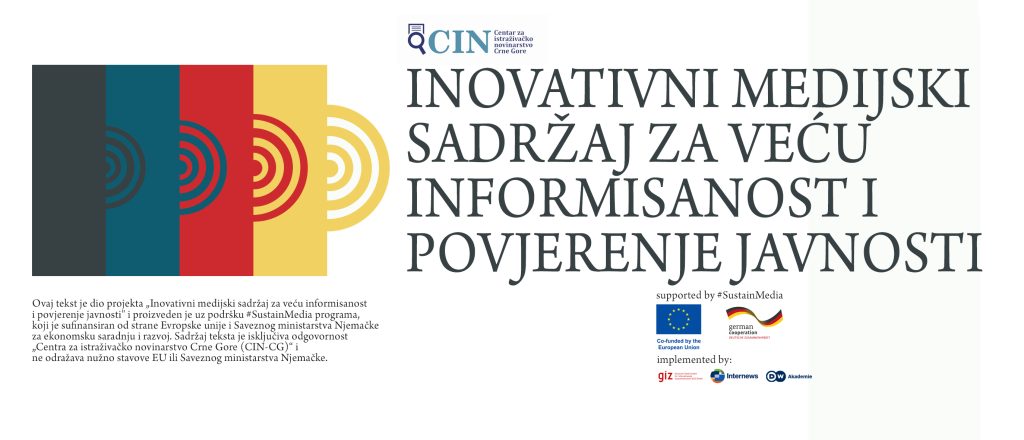
U Crnoj Gori je u toku vakcinisanje protiv HPV (humana papiloma virus) infekcije. Vakcina je namjenjena djeci i mladima od devet do 26 godina. Cilj ankete Centra za istraživačko novinarstvo Crne Gore (CIN-CG) je da provjeri kolika je zainteresovanost mladih do 26 godina da se vakcinišu protiv HPV, kao i kolika je zainteresovanost među roditeljima da vakcinišu svoju maloljetnu djecu.
U Crnoj Gori zdravstvene institucije koriste informacione sisteme koji bi trebalo da olakšaju pristup zdravstvenim uslugama pacijentima, kao i posao ljekarima. Cilj ankete je da se utvrdi koliko pacijenti koriste informacione sisteme zdravstvenih institucija, a koliko oni i na koji način olakšavaju rad ljekarima.
Montenegro has over 300 uncontrolled landfills, and most municipalities fail to implement recycling or waste separation practices. Alarmingly, the situation has worsened over the past decade. Every year, millions of euros are wasted, and the environment continues to suffer from increasing pollution.
Andrea Perišić
"For the past two years, I've been collecting every plastic and glass bottle, hoping to find a place where I can ensure they'll be properly recycled," an interviewee from Podgorica shared with the Center for Investigative Journalism of Montenegro (CIN-CG). She is among the few who actively separate waste in the household.
Montenegro has only 13 recycling centers, located in Podgorica, Herceg Novi, and Kotor. In 2019, a mobile waste container was introduced in the capital, and more recently, recycling machines have been installed in some areas.
In the recycling yard located in Zabjelo, Podgorica, various containers are designated for different types of waste: electronic and electrical items, paper and cardboard, glass, tires, aluminum cans, PET packaging, plastic, white goods, bulky metal waste, fluorescent tubes, batteries, eco-waste, and waste oil. Nearly everything is recyclable here except textiles.
However, few people use these recycling yards. The containers are often half-empty, with some barely containing anything, such as the one for electronic waste, which holds only a handful.
Most people are unaware of these recycling yards, and recycling efforts are poorly promoted. The issue lies in the fact that the centers in Podgorica are situated in locations that are not easily accessible to most of the population.
Since these recycling yards are used voluntarily, they are primarily utilized by environmentally conscious citizens. Waste separation should be mandatory and implemented at the source, directly from door to door. This would make the system more accessible and convenient, which is key to its success and achieving good results. Only then can we expect higher rates of separate waste collection and recycling," representatives from the NGO Zero Waste Montenegro stated to CIN-CG.
According to the NGO, once the infrastructure for waste separation is in place, it is crucial to focus on education and raising awareness about recycling and proper waste management.
The lack of awareness about the importance of recycling is clearly reflected in the situation, which has worsened compared to a decade ago, when Montenegro began negotiations with the European Union (EU), where waste management was one of the key topics.
"This is the fourth year without a State Waste Management Plan, and as a result, there are no local plans either. In a sense, waste management in Montenegro is happening in an unmanaged, 'natural' way," Ivana Vojinović, director of the Center for Climate Change, Natural Resources, and Energy at the University of Donja Gorica (UDG) says to CIN-CG.
According to her, no waste prevention plans have been implemented at the local level, despite being a requirement of European legislation and a crucial first step in fostering a recycling culture.
The country loses tens of millions of euros annually, if not more, while the environment suffers due to the lack of recycling and waste separation.
As part of its EU accession negotiations, Montenegro is required to recycle at least 50 percent of municipal waste by 2030. However, in 2022, the country recycled less than half a percent. This is highlighted in the Report of the Statistical Office of Montenegro (Monstat), published at the end of last year. In 2022, approximately 336,000 tons of municipal waste were produced, with just over 1,000 tons being recycled.
According to Monstat data, in 2022, Montenegro generated 1.412 million tons of waste, of which approximately 20 percent were classified as hazardous. Additionally, the average resident produced 544 kilograms of waste annually, or roughly 1.5 kilograms per day.
Landfill and Recycling Ltd, from Podgorica, which manages the recycling center, informed CIN-CG that in 2023, 560 tons of municipal waste were recycled. The materials sorted include cardboard, paper, iron, aluminum cans, plastic bags, PET packaging, and mixed plastics.
Moving Backwards Instead of Forward
As Montenegro recycled less than half a percent of its waste in 2022, the country is regressing rather than progressing in its EU negotiations. In 2021, recycling rates were around two percent, similar to 2020 and 2019. Interestingly, Montenegro recycled more in 2013, when EU negotiations first began, than it has in recent years.
The Strategy for Waste Management in Montenegro until 2030 only provides data on waste composition for 2013. That year, approximately 244,000 tons of municipal waste were generated, including about 32,000 tons of paper, 29,000 tons of plastic, 20,000 tons of glass, and 13,000 tons of PET packaging.
According to the current price list from the Podgorica company "Landfill and Recycling Ltd." the purchase price for old newsprint and office paper ranges from 20 to 60 euros per ton, depending on the grade and type. Plastic is priced at 25, 30, or 50 euros per ton, while PET packaging is valued between 80 and 250 euros per ton. If these materials were recycled, Montenegro could save millions of euros, which currently end up in illegal or poorly managed landfills. At the lowest prices, recycling paper alone could generate around 650,000 euros, recycling plastic could bring in 725,000 euros, and PET packaging could yield over a million euros.
In the Report on the Implementation of the State Waste Management Plan for 2013, it was stated that in most municipalities, containers for the primary selection of municipal waste (paper, cardboard, metal, plastic, glass) were installed, but that the collection of selected fractions is not done separately. Still, the containers with selected and mixed waste are emptied simultaneously, and the selected part then ends up in one of the mixed landfills.
CIN-CG contacted all municipalities in Montenegro and found that most do not implement separate waste collection despite local authorities' decisions to do so.
"We were unable to implement the decision due to personnel and technical limitations," stated the "Communal Activities" department in Šavnik to CIN-CG.
Other municipalities have expressed the same concerns.
"Waste recycling has never been implemented in Žabljak, although we do have a facility that was used for sorting waste, not recycling, even during its operational period," officials from the Office of the President of the Municipality of Žabljak told CIN-CG.
Cetinje lacks a facility for recycling and sorting mixed municipal waste, and the existing planning documentation does not include plans for its construction.
"Mixed municipal waste collected by LLC 'Municipal Services' Cetinje is transported daily from the municipality to the regional sanitary landfill 'Livade' in Podgorica, where it is sorted in a dedicated facility," the Office of the Mayor of the Capital City Cetinje told CIN-CG.
The municipality confirmed that there is no recycling center in Andrijevica and that no funding is available for its construction.
According to the Plav municipality, starting in 2021, Plav began recycling paper, PVC waste, cardboard, and glass using dedicated presses.
Local authorities in Herceg Novi say the decision on separate waste disposal is only partially implemented due to low awareness among residents. They also highlight that non-compliance with the Waste Management Law is one of the major challenges for recycling.
Meanwhile, the proposal for this law was adopted by the Parliament of Montenegro at the end of last year. It addresses the management of waste from single-use plastic products and plastic-containing fishing gear, among other issues.
Improper Waste Disposal in Podgorica: Mixed Waste Found in Dry Fraction Bins
Municipal Service from Podgorica also confirmed that separate waste collection has yielded minimal results to CIN-CG. They explained that the system was initially designed with three bins (for paper, plastic, and metal), later reduced to two bins (for dry and wet municipal waste fractions). However, the crucial element of waste separation at the source, specifically in households, was lacking. As a result, the bins are predominantly filled with mixed municipal waste.
In mid-January of this year, the company monitored the unloading of a truck emptying containers designated for the dry fraction of waste to assess the content of the collected material. The analysis revealed that citizens were not correctly using the container for the dry fraction, despite prominent labels and numerous appeals through the media. Instead, they are disposing of mixed municipal waste in it.
"This confirms that citizens are not embracing this waste disposal system. Given that changing habits is challenging, we believe implementing a penalty policy would be the quickest way to address non-compliance with waste management rules," the company stated.
The Office of the Mayor of Cetinje explains that no effective, incentivizing pricing policy is in place. Companies providing municipal waste collection services could offer discounts to households that separate recyclable waste generated within the home.
Montenegro Lacks a Landfill for Hazardous Waste and Has No Plans to Build One
"A woman from Podgorica, researching pesticides, told CIN-CG, that the company for sanitary and environmental protection "Hemosan" Ltd. Bar the only one licensed for proper hazardous waste disposal, wanted to charge me around 100 euros, plus VAT, for transporting two small pesticide packages from Podgorica to Bar and storing them—services I was hoping to dispose of.'"
In the end, despite the pesticides being classified as hazardous waste, she had no choice but to dispose of them in a regular container.
Unfortunately, it's not uncommon for irresponsible individuals to leave waste outside containers, including dangerous materials.
Montenegro lacks a designated landfill for hazardous waste, and there are no plans to establish one in the current State Waste Management Plan for 2015-2020 or the draft plan for 2023-2028.
For years, in the Konik settlement of Podgorica, in Ćemovsko Polje and behind the landfill, irresponsible individuals have been setting fire to tires in order to extract and sell the wire. These fires have often spread uncontrollably. The burning of tires releases dioxin, a highly toxic pollutant that, according to the World Health Organization (WHO), can cause reproductive and developmental issues, weaken the immune system, disrupt hormones, and lead to serious diseases, including cancer.
For decades, the government has failed to find an effective solution to address this problem.
Medical waste, various types of batteries, and accumulators continue to be disposed of recklessly.
In Montenegro, the planned opening of the Brskovo mine near Mojkovac raises concerns, as the potential consequences of the waste generated there have been overlooked. If mishandled, the waste from the mine, which could contain mercury and other heavy metals such as cadmium and arsenic, poses a significant risk to both the environment and the health of Montenegro's residents.
Kotor is the Only City Separating Paper, Plastic, Glass, and Metal for Recycling
By the time this investigation was published, CIN-CG had not received responses to several questions from other municipalities. However, the 2022 Report on the Implementation of the State Plan for Waste Management in Montenegro, released at the end of last year, reveals that municipalities such as Bijelo Polje, Danilovgrad, Gusinje, Pljevlja, Ulcinj, Tuzi, Rožaje, Petnjica, Berane, Budva, and Bar do not have separate waste disposal systems in place.
The situation is somewhat better in Herceg Novi, Kolašin, Kotor, and Tivat, where bulky and green waste are collected separately, and compost bins are used to process significant amounts of green waste. A composting plant is planned for four municipalities—Kotor, Herceg Novi, Budva, and Tivat—but its capacity is limited, meaning it currently only processes waste from the city of Kotor.
These data indicate that the municipalities of Andrijevica, Berane, Bijelo Polje, Žabljak, Danilovgrad, Nikšić, Gusinje, Pljevlja, Plužine, Cetinje, Rožaje, Ulcinj, Šavnik, Petnjica, and Tuzi have not separated any waste for recycling.
The other municipalities included in the report—Bar, Mojkovac, Budva, Podgorica, Kolašin, Tivat, and Herceg Novi—separate at least some paper, glass, plastic, and metal for recycling. However, Kotor stands out by preparing all these materials for reuse, processing about a thousand tons of waste.
"The recycling issue is deeply systemic, as many local governments struggle to manage the waste they generate. At the state level, there are no clear guidelines outlining who is responsible for the complex waste collection, sorting, and recycling process. Additionally, there is little incentive to change the status quo, as recycling is not currently a competitive alternative to traditional waste disposal," Ivana Vojinović explains.
As she explains, to make the recycling system effective, the work of inspection authorities must be enhanced.
"Montenegro needs to improve its recycling rate, which is currently one of the lowest in Europe. Adopting European standards would transform how we manage waste, leading to more household bins, better waste disposal planning, and the procurement of specialized bins and bags. This approach, which has long been established in many countries, would foster a recycling culture still in its early stages in Montenegro," Vojinović says.
CIN-CG contacted the communal police of several municipalities to inquire about the number of fines issued for improper waste disposal from 2018 through the end of last year. Only the municipalities of Pljevlja, Budva, and Kotor responded.
Only three fines, ranging from 30 to 1,000 euros, were issued for this offense in Pljevlja, all of which were imposed on individuals. "In many cases, it was impossible to identify the perpetrator," Pljevlja Communal Police stated.
In Budva, 354 misdemeanor orders were issued, totaling 65,470 euros, for improper waste disposal, mostly near container stations and along local and main roads. "The municipality of Budva has not had a designated waste disposal site for five years, as required by planning documents, which complicates enforcement," representatives of the Budva Municipal Police stated. They noted that illegal dumping typically occurs in the evening, when fewer communal inspectors are on duty, with frequent violations reported in areas such as Jaz, Topliški Put, Markovići, Stanišići, Reževici, Bečići, Paštrovska Gora, and Buljarica.
According to the Kotor Inspection Service, 15 individuals were fined 7,500 euros, while 16 legal entities were penalized with fines totaling 22,000 euros.
Waste Management Crisis in Nikšić: No Plan in Sight Despite Rising Pollution
Nikšić lacks a system for separate municipal waste collection and recycling, making it the only municipality in Montenegro without a plan for managing municipal and non-hazardous construction waste for years.
"They clearly don't understand their priorities," activist Ivana Čogurić says.
"The Gračanica River has been turned into a landfill along its entire course. Instead of addressing this environmental issue, they are focusing on the reconstruction of bridges over the river, which, according to experts, are in excellent condition," Čogurić from the "Ecopatriotism" movement highlights.
She emphasizes recognizing waste as a resource and suggests street recycling machines to encourage citizens to recycle beyond their homes. "This way, people could receive money for recycling cans and bottles immediately."
Recently, Podgorica installed recycling machines in five locations where citizens can exchange plastic bottles (PET) or cans for food for homeless dogs. A similar initiative exists in Kotor, where citizens can "buy" food for street cats by recycling plastic bottles, a symbol of the city.
The Nikšić Municipality's Secretariat for Communal Affairs and Traffic told CIN-CG they have prepared a Draft Local Plan for managing Communal and Non-Hazardous Construction Waste. They also reported that technical documentation for building a recycling yard is in progress, along with a draft decision on the municipality's separate collection and disposal of communal waste.
Europe Recycles Over 50% of Municipal Waste
According to data from the Draft State Waste Management Plan for the period from 2023 to 2028, in 2020, Montenegro recorded over 300 illegal landfills. The highest concentration of these uncontrolled dumpsites is in Bijelo Polje, which accounts for 106.
For years, the European Commission (EC) has repeatedly warned that little progress has been made in waste management, and that Montenegro's national legislation is only partially aligned with EU standards.
According to the European Environment Agency (EEA), nearly all European countries, except Sweden, have significantly improved their municipal waste recycling rates since 2004. Countries like Germany, Austria, Slovenia, the Netherlands, Denmark, Belgium, Luxembourg, Switzerland, and Italy recycle up to 50% or more of their municipal waste.
Finland and Sweden recycle about 40% of their waste, while Poland recycles even more.
However, some countries, such as Cyprus, Malta, Turkey, and Romania, still recycle less than 20% of their waste. Croatia recycles about 30%, Bosnia and Herzegovina around 20%, and Serbia approximately 15%. All of these countries outperform Montenegro in waste recycling.

Jedan od najvrednijih ugovora koje je gradonačelnik Budve potpisao iz Spuža je onaj sa kompanijom Carat, na čijem je čelu Dragan Perović, sa kojim Božović ima lične i poslovne veze - na Dubovici, gdje Carat gradi infrastrukturu, obojica su suvlasnici zemljišta i stambenog prostora
Predrag Nikolić
Predsjednik Opštine Budva Milo Božović je iz zatvora sa Draganom Perovićem, izvršnim direktorom budvanske kompanije Carat, potpisao ugovor vrijedan četiri i po miliona eura. To je urađeno 28. jula prošle godine, tri i po mjeseca nakon što je Božović priveden u Spuž.
Prema više izvora, Božović i Perović su kumovi. Draganov brat Radovan Perović uhapšen je početkom oktobra prošle godine. Njega, Bojana Ojdanića i Vjekoslava Lambulića Specijalno državno tužilaštvo (SDT) sumnjiči da su počinili krivična djela stvaranje kriminalne organizacije i neovlašćenu proizvodnju, držanje i stavljanje u promet opojnih droga. Njihovo hapšenje uslijedilo je kao proširenje istrage koju SDT vodi protiv Božovića.
Ovo je samo jedan od ugovora vrijednih preko 12 miliona eura, koje je prvi čovjek Budve potpisao iz istražnog zatvora, ali je posao sa kumom pojedinačno najvrijedniji, 4.499.181 eura. Ugovor sa firmom Carat odnosi se na radove komunalnog opremanja za izgradnju tri saobraćajnice u zahvatu DUP-a Dubovica 1. U ugovoru se navodi da će se finansirati iz više budžetskih godina. Za prošlu godinu iz budžeta je za ovo bilo opredijeljeno 400.000 eura.
Božovića sa Perovićem ne vezuju samo lične veze. Oni su i poslovni partneri. I to baš na Dubovici, gdje je Božovićeva đedovina. Tamo su on i Perović suvlasnici zemljišta i stambenog prostora. Na preko hiljadu kvadrata zemljišta svojinski udio ima osam vlasnika, Milo Božović posjeduje pola, a Perović 24/480 zemljišta. U drugoj parceli od 1.738 kvadrata Božović ima pola udjela, a Perovićeva firma Carat šesnaestinu, isti odnos je i u vlasništvu nad trećom parcelom od 320 kvadrata.
Odnos jedna polovina i jedna šesnaestina vlasništva između Božovića i Carata je i u slučaju stambenog prostora na Dubovici od 824 kvadrata. Prema dokumentima u koje je Centar za istraživačko novinarstvo Crne Gore (CIN-CG) imao uvid, u februaru i martu prošle godine Carat prodaje više stanova u ovom objektu.
U isto vrijeme kada i ovaj, u julu 2023, Božović i Perović potpisuju i ugovor o radovima na izgradnji saobraćajnice A 75-75 u Bečićima. Vrijednost ovog ugovora je 346.813 eura, a podugovarači Carat-a su Ving, Pljevlja, La Collina, Podgorica, Geo Plus, Podgorica i Hidromont Inženjering, Podgorica.
Božović je tokom prošle godine iz zatvora u Spužu potpisao još ugovora po javnim nabavkama, ukupno preko 10 miliona eura. Ta praksa nastavljena je i tokom ove godine. Za samo prva dva mjeseca Božović stavio potpis na javne nabavke vrijedne dva miliona eura.
Milo Božović uhapšen 13. aprila 2023. rano ujutro. Specijalno državno tužilaštvo podiglo je optužnicu u kojoj ga terete za stvaranje kriminalne organizacije i šverc droge. I dok je pred Višim sudom još kontrola optužnice, isti taj sud je odobrio Božoviću da iz zatvora potpisuje opštinska dokumenta i vodi Opštinu.
TENDERI DOSTUPNI NAKON INTERESOVANJA NOVINARA
Na sajtu Opštine Budva, pod rubrikom Tenderi i javne nabavke, zainteresovanoj javnosti nijesu bile dostupne informacije o svim ugovorima. Tek nakon pitanja koje je CIN-CG uputio, krajem februara, tenderi i javne nabavke su ažurirani i sada su dostupni.
Bemax je drugi veliki partner Opštine Budva. Sa ovom kompanijom Božović je potpisao ugovor za jednu od najznačajnijih investicija - rekonstrukcija dvije ključne ulice u centru grada - 22. novembar i Mediteranske - i njihovo pretvaranje u bulevare sa izgradnjom kružnog toka.
Uz dozvolu Višeg suda, Božović je u spuškom Istražnom zatvoru, krajem prošle godine potpisao ovaj ugovor, da bi ga 12. januara potpisali i izvršni direktor Bemax-a Miladin Mijajlović i ovlašćena zastupnica ove kompanije Sonja Novaković. Vrijednost posla je blizu tri miliona, odnosno 2.924.681 eura. Naglašeno je i da će se ova investicija finansirati iz više budžetskih godina, a za ovu godinu je opredjeljeno 1.650.000 eura. Bemax-ovi radovi u centru grada dočekaće ove sezone turiste jer je rok za izvođenje radova 160 dana od uvođenja izvođača u posao.
Sedmicu nakon potpisivanja ovog ugovora, pripadnici Specijalnog policijskog odjeljenja uhapsili su Aleksandra Aca Mijajlovića, jednog od doskorašnjih suvlasnika kompanije Bemax. On i još pet osoba lišeni su slobode zbog šverca cigareta, odnosno sumnje da su počinili krivično djelo stvaranje kriminalne organizacije i produženo krivično djelo krijumčarenje.
Podugovarač Bemax-u u ovom poslu je BB Solar, biznismena Blaža Đukanovića, sina nekadašnjeg premijera i šefa države Mila Đukanovića. Ugovorom je precizirano da je Đukanovićeva firma zadužena za izvođenje elektrotehničkih radova. Za to je sljeduje procenat od 16,27 odsto, ili 488.000 eura.
Božović je početkom ove godine parafirao i milionski ugovor o izgradnji puta u naselju Blizikuće iznad Svetog Stefana. Ugovor vrijedan 1.249.637 eura je sklopljen sa konzorcijumom SBM, koga zastupa Vladimir Mirković.
Mirković je izvrši direktor Asfalt-beton gradnje, Podgorica, koja je nosilac ponude u ovom poslu u koji su još uključeni - firme Đurković, Nikšić, sa učešćem od 32,23 odsto, Tofi, Rožaje, 6,81 odsto učešća, Breznamont, Nikšić, 5,48 udjela, Hidromont, Podgorica, učešće od 4,31 odsto i Geotin MNE, Podgorica, učešće 0,96 odsto.
Pored pola miliona eura koje će Asfalt-beton gradnja zaraditi u ovom poslu, oni su neposredno prije nove godine sa Božovićem zaključili ugovor o održavanju gradske infrastrukture, koji je vrijedan 389.871 eura. Asfalt-beton gradnja je i tokom prošle godine održavala gradsku infrastrukturu za istu svotu, a potpisan je i ugovor o sanaciji postojećih saobraćajnica, vrijedan preko 400 hiljada eura.
U gorepomenutom kapitalnom poslu od četiri i po miliona eura, čiji je nosilac Carat, učešće Asfalt-beton gradnje je 21,65 odsto.
Saradnja sa ovom firmom nastavljena je i ove godine - 21. februara potpisan je ugovor o radovima na komunalnom opremanju zemljišta, za 35.829 eura.
NASTAVAK CAREVIĆEVE PRAKSE
Potpisivanjem pet ugovora u kojima je uključena Asfalt-beton gradnja, a koji su vrijedni preko dva miliona eura, Božović je nastavio praksu svoga prethodnika Marka Carevića, takođe kadra Demokratskog fronta.
MANS je u maju 2020. podnio Specijalnom državnom tužilaštvu krivičnu prijavu protiv Carevića okrivljujući ga što je asfaltiranje saobraćajnica dodjeljivao firmi Asfalt-beton gradnja, kako bi njegova firma Carinvest, kao podizvođač, obavljala milionski posao. Iz MANS- su tada tvrdili da je Carević sa kompanijom Asfalt-beton gradnja zaključio 11 ugovora, ukupne vrijednosti od skoro dva miliona eura. U oktobru 2020. SDT na čijem je čelu bio Milivoje Katnić odbacilo je ovu krivičnu prijavu.
Od brojnih ugovora koje je Božović potpisao po visini iznosa ugovora, od preko tri miliona eura, izdavaju se i one koje su sklopljene sa firmom Inženjer Gogić iz Podgorice. Sredinom januara ove godine sa ovom firmom Božović potpisuje ugovor o izvođenju radova na izgradnji donje ploče kanala ispod mostovske konstrukcije u Bečićima i povezivanje sa postojećim kanalom, cijena 47.632 eura.
U februaru prošle godine sa firmom Inženjer Gogić, Božović je potpisao tri ugovora: za izgradnju ulice sa kompletnom infrastrukturom uz potok Slatava u Buljarici - 1.638.757 eura, radove na regulaciji Bečićkog potoka - partija 1: 1.075.555 eura, partija 2: 470.760 eura.
Ugovore je sa Božovićem potpisala Zerina Idrizović izvršna direktorka preduzeća čiji je osnivač i vlasnik Miljan Gogić. U CRPS registru se navodi da Gogić ima udio od 90 odsto, dok 10 odsto pripada Društvu za trgovinu i usluge, export-import Koti group, Tuzi. Osnivač, izvršni direktor i ovlašćeni zastupnik ovog preduzeća čija je djelatnost - nespecijalizovana trgovina na veliko je Veljko Lakočević.
Lakočević je bio većinski vlasnik Inženjera Gogić do marta 2021. Godinu ranije on je, preko ove firme, kupio ogromnu staklenu zgradu u centru Podgorice, preko puta Njegoševog parka.
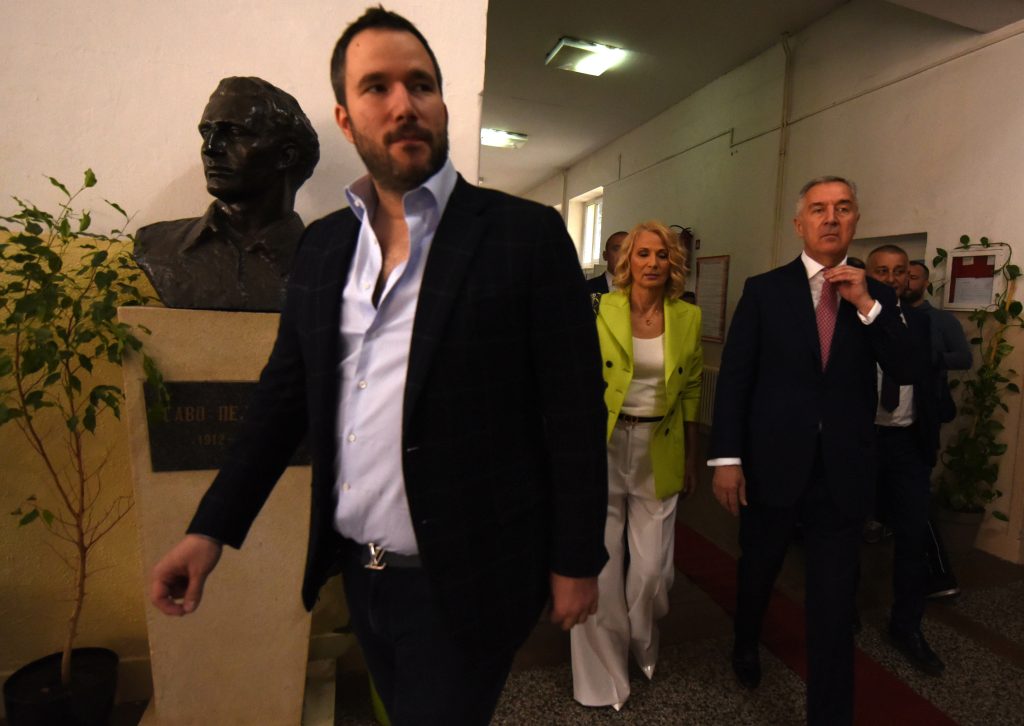
MANS je u decembru 2021. objavio istraživanje po kojem je Uprava za imovinu, umjesto da zbog nepravilnosti prekine tender za navedenu zgradu, zaključila ugovor sa kompanijom Koti nekretnine na iznos od oko 8,7 miliona eura.
U vrijeme sporne transakcije vlasnik kompanije Koti nekretnine bila je kompanija Inženjer Gogić. Lakočeviću je, u septembru 2019, svoj udio u toj kompaniji prenio Vladan Ivanović, i to bez naknade.
Vladan Ivanović je i vlasnik kompanije Master Inženjering, a bio je i u vlasničkoj strukturi firme Novi Volvox njegovog brata od strica Milana Ivanovića. Ivanovići su biznismeni navodno bliski porodici Đukanović.
Duško Knežević je nakon afere o ničijoj kući na Gorici, izjavio:
"Cijela Crna Gora zna da je to Đukanovićeva kuća, iako se vodi na njegovog prijatelja Vladana Ivanovića".
Prema Planu javnih nabavki Opštine Budva, od 31.1.2023, njihova ukupna vrijednost te godine trebala je da bude 26 miliona eura. Prema dostupnim ugovorima, plan nije ostvaren - potpisani su ugovori za radove, usluge i nabavke oko 15 miliona eura.
Plan javnih nabavki za ovu godinu je preko 19 miliona eura, dakle ostalo je još 17 milona.
Nakon što je Božović uhapšen strahovalo se da se neće moći realizovati ni jedan postupak javne nabavke, kao ni ostali pravni poslovi. Dodatni problem je bio to što Božović prije hapšenja nije imenovao potpredsjednike Opštine. Tražila se Božovićeva ostavka da bi Opština mogla nesmetano da funkcioniše. Pravne dileme je riješio Viši sud u Podgorici koji je odobrio Božoviću da u zatvoru potpisuje sva pravna akta.
I dok pravni i drugi haos u Opštini Budva traje, iz Ministarstva javne uprave su napokon najavili da su krenuli u preispitivanje zakonitosti rada pritvorenog predsjednika Božovića.

Ni godinu dana nakon što je opredijeljeno više stotina hiljada eura za nabavku softvera za sistem automatske razmjene međunarodnih finansijskih informacija (AEOI), novac nije potrošen u te svrhe, niti je softver nabavljen. To šteti međunarodnom kredibilitetu Crne Gore, jer se ne mogu u potpunosti pratiti i sankcionionisati moguće utaje poreza i pranje novca, sa čim naša zemlja inače ima problema
Tijana LEKIĆ
Gora se još u julu 2022. obavezala na razmjenu informacija za suzbijanje utaje poreza na globalnom nivou, ali se još nijesu ispunjeni osnovni preduslovi za to, jer nije nabavljen aplikativni softver za informacioni sistem, iako su još prije godinu dana za to bila odvojena sredstva.
Ovu obavezu naša je zemlja preuzela multilateralnim sporazumom koji je potpisla sa Organizacijom za ekonomsku saradnju i razvoj (OECD), to jest sa njenim Globalnim forumom o transparentnosti i razmjeni informacija u poreske svrhe (Globalni forum), čije je sjedište u Parizu. Sporazum je potpisalo ukupno 147 zemlja, a preko sto država već razmjenjuje podatke putem ovog sistema. Podatke već razmjenjuju sve zemlje Evropske unije (EU), ali i Albanija, pa i poreski rajevi kao što su Bahami, Bermudi, Panama i druge.
Crna Gora je Globalnom formu garantovala da će do kraja 2023. godine, preko standardizovane automatske razmjene podataka (AEOI) početi da razmjenjuje informacije o finansijskim računima poreskih obveznika, ali to se još nije desilo, rekla je za Centar za istraživačko novinarstvo Crne Gore (CIN-CG) Zajda Manata, čelnica Sekretarijata Globalnog foruma.
Cilj uspostavljanja razmjene podataka na globalnom nivou je da se spriječe poreske utaje putem automatske i standardizovane razmjene podataka o finansijskim računima između poreskih institucija zemalja učesnica sporazuma. Ovaj zajednički informacioni sistem omogućava dostupnost podataka da je, recimo, poreski obaveznik Crne Gore otvorio račun i u nekoj drugoj zemlji. Preko AEOI, ti se podaci prvo evidentiraju u poreskoj upravi zemlje u kojoj je otvoren račun, a potom se informacije prosljeđuju poreskoj upravi zemlje u kojoj je vlasnik računa poreski obveznik.
Informacije, uz poštovanje zaštite ličnih podataka razmjenjuju, obuhvataju bankovne račune i identitet vlasnika, broj računa, stanje na računu na kraju godine, prihode, kamate, dividende, bruto prihode, račune elektronskog novca i tekuće račune fizičkih i pravnih lica koja posjeduju finansijska sredstva.
Dok ne uspostavi ovaj sistem Crna Gora gubi priliku da prati tokove novca svojih građana, da ima uvid u moguće utaje poreza i pranje novca. Ako nije u sistemu dodatno ugrožava međunarodni kredibilitet, koji je zbog poznatih problema ionako upitan.
Sredstva nijesu upotrijebljena za nabavku softvera
Za aktiviranje AOEI sistema u Crnoj Gori je, kako su CIN-CG-u objasnili iz Ministarstva finansija, odgovorna bila nekadašnja Uprava prihoda i carina, koja je preuzela obaveze oko nabavke softvera još 2023, godine kada je bivša Vlada odobrila sredstva za nabavku softvera.
,,Ministarstvo finansija je u februaru 2023. uputilo Vladi Crne Gore informaciju o potrebi obezbjeđivanja sredstava za nabavku, primjenu i održavanje informacionog sistema AEOI. Vlada Crne Gore nas je zadužila da za realizaciju ovih aktivnosti izvršimo preusmjerenje sredstava u visini od 363 hiljade eura”, naveli su za CIN-CG iz Vladinog resora na čijem je čelu Novica Vuković.
Ta sredstva su tada stigla do Uprave poreza i carina, međutim, nijesu u toku 2023. iskorišćena za nabavku ovog softvera. Nije pokrenut postupak javne nabavke, niti je sprovedena tenderska procedura. Za to je bio nadležan bivši direktor Uprave prihoda i carina Vladimir Bulajić.
CIN-CG je pokušao da stupi u kontakt sa njim, ali on, do objavljivanja ovog teksta, nije odgovorio na brojna pitanja.
Uprava prihoda i carina je doživjela više institucionalnih promjena u posljednjih nekoliko godina. Poreska uprava i Uprava carina su 2021. godine odlukom 42. Vlade, u vrijeme kada je ministar finansija bio Milojko Spajić, spojene. Nakon malo manje od tri godine, ove dvije institucije su ponovo razdvojene, odlukom 44. Vlade čiji je premijer Spajić.
Istovremeno, ova institucija je promijenila i više direktora i vršioca dužnosti (VD). Jedno vrijeme je bila i bez vršioca dužnosti, pa je tim organom koordinirao ministar finasija Vuković. Nedavno je na čelo Poreske uprave (PU) kao vršilac dužnostiizabran Sava Laketića. Dolazak novog rukovodioca podrazumijeva i novu sistematizaciju.
U takvim okolnostima, stalnim izmjenama statusa i ljudi na čelu Uprave, postavlja se pitanje koliko je ova institucija mogla efikasno da vrši svoje nadležnosti.
,,Uspostavljanje sistema za Automatsku razmjenu podataka (aplikativni softver, sistemski softver i hardverska infrastruktura) je vrlo zahtjevan radni izazov”, saopštili su CIN-GG-u iz Ministarstva finansije. Obezbjeđen je, međutim, jasan pravni okvir, kao i prateći administrativni servis, tvrde iz Vukovićevog resora. Da bi se izbijegli potencijalni propusti oko nabavke softvera, pojasnili su, da su donijeli odluku da se raspiše tender za softversko rješenje koje se već koristi u najmanje jednoj državi članici OECD-a, navodi se u odgovorima.
Tender još nije raspisan, a za uspostavljanje inicijalnog informacionog sistema, kada se softver nabavi, procijenjuju u Mnistarstvu finasija, biće potrebno od 30 do 120 dana, a tek nakon toga kreće testiranje.
„...Neophodno je omogućiti adekvatan vremenski interval za testiranje sistema od strane finansijskih institucija prepoznatih kao obveznika izvještavanja (minimum četiri mjeseca) i ovlašćenih službenika Poreske uprave kao vlasnika poslovnih procesa. Nakon prihvatanja rezultata testiranja i utvrđene funkcionalnosti, sistem se pušta u produkcioni rad u dijelu prikupljanja podataka i slanja istih državama sa kojima je neophodno potpisati sporazum o AEOI“, saopštili su iz Ministarstva finasija.
Kada se sve ovo ima u vidi teško je vjerovati da će Crna Gora ubrzo početi sa razmjenom podataka preko ovog sistema na globalnom nivou.
Crna Gora bez softvera ne može da vodi ozbiljnu poresku politiku
,,Uspostavljanje ovakvog sistema razmjene informacija je samo početna priča i tek treba da se formira odsjek koji bi se bavio poreskim malverzacijama. Razmjena informacija sa stranim poreskim organima ne ide samo u korist drugim zemaljama, već je to bitno i za nas, jer je to ključno za ozbiljnu borbu protiv korupcije i kriminala. Bez saradnje sa drugim zemljama mi ne možemo doći do relevantnih podataka”, objasnio je za CIN-CG ekonomista i bivši ministar finansija Aleksandar Damjanović.
Primjena pomenutog sistema omogućava cijelovitije ispunjavanje obaveza iz pregovaračkog poglavlja 16 koji se odnosi na poresku politiku. Iz Ministarstva finansija dodaju da bi se funkcionisanjem ovog sistema povećali prihodi u budžetu Crne Gore.
Pranje novca je, prema riječima profesora ekonomije Zarije Pejovića, veliki problem u Crnoj Gori, i prije uvećanja broja stranaca koji u njoj sada žive. ,,Ako analiziraju podaci bruto domaćeg proizvoda za, recimo, 2021. godinu, vidjećemo da se ne poklapala suma ukupnih zarada koje su isplaćene u Crnoj Gori, oko nekih milijardu i po, sa ukupnom potrošnjom od oko tri i po milijarde. To je veliki jaz”, kaže Pejović.
Opisane disproporcije zahtijevaju temeljnu analizu i odgovor da li je i u kojoj mjeri ovako velika potrošnja prouzrokovana nelegalnim tokovima novca, iako je jasno da dio novca dolazi od doznaka iz inostranstva.
Procjene su da oko pola miliona građana Crne Gore živi van njenih granica. U zemlji trenutno ima i oko 95 hiljada stranaca sa privremenim ili stalnim boravkom, ili po osnovu privremene zaštite, pokazuju podaci Ministarstva unutrašnjih poslova (MUP).
Nedovoljna transparentnost tokova novca obeshrabruje dolazak kredibilnih međunarodnih investitora, a utiče i na nekontrolisani rast sive ekonomije.
Crna Gora je u decembru prošle godine jedva izbjegla da se nađe na sivoj listi Radne grupe za finansijsku akciju (Financial Action Task Force - FATF). FATF je organizacija koja postavlja standarde u borbi protiv pranja novca i finansiranja terorizma, čiji je sekretarijat sastavni dio OECD-a.
Nejasno da li je policija u mogućnosti da koristi svoja ovlašćenja
Dva dana prije sjednice MONEYVAL-a koju čine eksperti Savjeta Evrope za procjenu mjera protiv pranja novca i finansiranja terorizma, Skupština Crne Gore je, po hitnom postupku, usvojila novi Zakon o sprječavanju pranja novca i finansiranja terorizma. Novim zakonom se uređuju mjere za sprečavanje i otkrivanja pranja novca i finansiranja terorizma, kao i poslovi, ovlašćenja i način rada finansijsko obavještajne jedinice (FOJ). FOJ vrši poslove otkrivanja pranja i finansiranja terorizma i to je organ koji funkcioniše pri Ministarstvu unutrašnjih poslova.
Tako je Crna Gora ispoštovala XXIX preporuku MONEYVALA i FATF-a koja predviđa uspostavljanje FOJ-a kao nacionalnog centra koji prikuplja podatke, radi analize sumnjivih finansijskih računa, vrši procjene rizika od pranja novca i finansiranja terorizma i te informacije prosljeđuje na potrebne adrese.
Prema Međunarodnom monetarnom fondu (MMF), FOJ ima više funkcija od administrativne; preko one sudskog-tužilačkog karaktera, do sprovođenja zakona (low-enforcement). Početkom 90-ih, kada su osnovane prve jedinice ove vrste nije bilo međunarodno prihvaćenog modela za funkcije FOJ-a. Svaka zemlja je to tijelo kreirala prema svojim potrebama. U nekim zemljama, kao kod nas, ta jedinica je bila u okviru Ministarstva unutrašnjih poslova. Dok u drugim zemljama, poput Italije, FOJ je ustrojen kao administrativno tijelo koje ima ulogu posrednika između finansijskih institucija i policije.
U analizi o funkcionisanju FOJ-a, koju je sačinio MMF, navodi se da se finansijske institucije, poput banaka, često suočavaju sa potencijalno problematičnim transakcijama, ali da nemaju mogućnost utvrđivanja dokaza o kriminalnim djelatnostima. Sa druge strane, FOJ može da vrši sve tehničke kontrole i kada utvrdi nepravilnost može da traži direktno od policije i tužilaštva da započnu istragu.
U novom Zakonu o sprečavanju novca Crne Gore, uređuje se način međunarodne saradnje FOJ-a: ,,U cilju uspostavljanja, ostvarivanja i unapređenja međunarodne saradnje FOJ može da zaključuje sporazume sa ovlašćenim organima drugih država i međunarodnim organizacijama o razmjeni finansijskih informacija”.
Razmjena informacija sa drugim zemljama je zakonski predviđena, ali ne preko automatskog standarda, nego na zahtjev segmenta policije, znači kada postoji sumnja na nezakonite radnje.
,,Najveći broj identifikovanih nedostataka uključuje i odsustvo odredbi koje zahtijevaju od nadležnih organa da brzo razmjenjuju informacije (…) Nejasno je da li je policija u mogućnosti da koristi svoja domaća istražna ovlašćenja za prikupljanje i dobijanje informacija u korist stranih kolega”, piše u posljednjem izvještaju MONEYVALA o Crnoj Gori.
Crna Gora je predmet pažnje MONEYVALA još od početka 2000-tih. Nije samo prošle godine, već je i ranije više puta, rizikovala da se nađe na nepoželjnoj listi FATF-a. U izvještaju za 2023, MONEYVAL, pored konstatacije da u Crnoj Gori postoji visoki rizik od pranja novca, navodi se i da je to “uglavnom povezano sa međunarodnom trgovinom droge, utaja poreza i iznuđivanja”.
,,Nepostojanjem adekvatnog protoka informacija mi smo defakto bez oružja za bilo koju ozbiljnu poresku politiku”, navodi Damjanović.
Da bi se sprovele ozbiljne reforme u poreskom sistemu Crne Gore nephodno je da država uspostavi saradnju sa međunarodnim organizacijama kako bi se efikasnije sprovela kontrola finansijskih tokova. Sudeći po tome koliko treba da se nabavi i stavi u funkciju softver za razmjenu poreskih informacija, naša država izgleda ne žuri da institucionalizuje saradnju na globalnom nivou u ovom polju.



